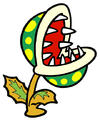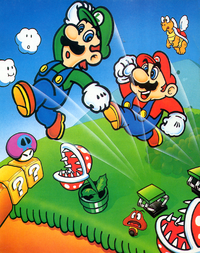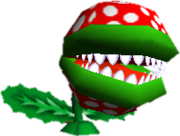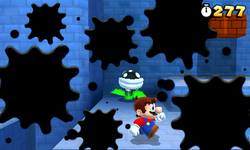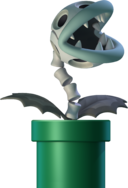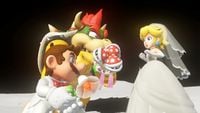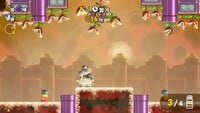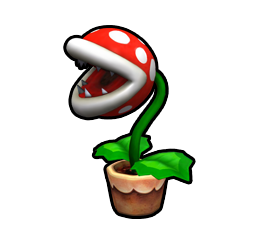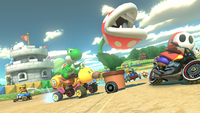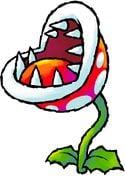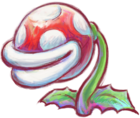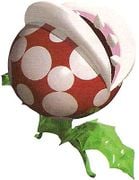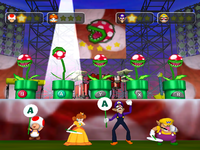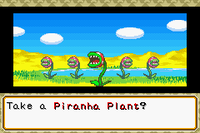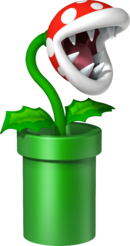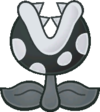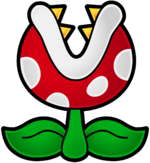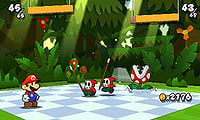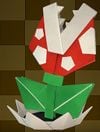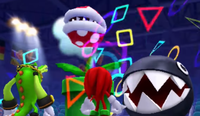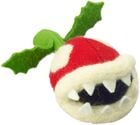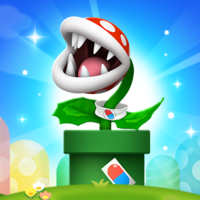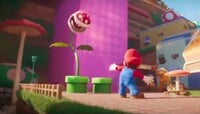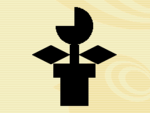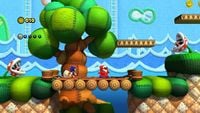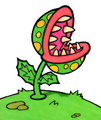Piranha Plant: Difference between revisions
| Line 36: | Line 36: | ||
[[File:SMBLL Mushroom Kingdom Artwork.png|thumb|Red Piranha Plants in ''Super Mario Bros.: The Lost Levels''.]] | [[File:SMBLL Mushroom Kingdom Artwork.png|thumb|Red Piranha Plants in ''Super Mario Bros.: The Lost Levels''.]] | ||
[[File:SMBLL Red Piranha Plant.png|frame|left]] | [[File:SMBLL Red Piranha Plant.png|frame|left]] | ||
The Piranha Plants returned in ''[[Super Mario Bros.: The Lost Levels]]'', which was the sequel to ''[[Super Mario Bros.]]'' in Japan, during the second conquest of the Mushroom Kingdom. The green variant found in the previous game does not appear after [[World 3 (Super Mario Bros.: The Lost Levels)|World 3]]. Starting from [[World 4-1 (Super Mario Bros.: The Lost Levels)|World 4-1]], they are replaced by the newly introduced red-colored variants, which are much quicker than the green variety, and can emerge from their pipe even if the player is next to it. However, both varieties will not appear if the player is standing directly on top of the pipe. They appear more frequently than in the previous game, and the red variant have been the most common Piranha Plants seen throughout the ''Super Mario'' franchise since. Beginning from [[World 5-1 (Super Mario Bros.: The Lost Levels)|World 5-1]], they will pop from upside-down pipes as well, | The Piranha Plants returned in ''[[Super Mario Bros.: The Lost Levels]]'', which was the sequel to ''[[Super Mario Bros.]]'' in Japan, during the second conquest of the Mushroom Kingdom. The green variant found in the previous game does not appear after [[World 3 (Super Mario Bros.: The Lost Levels)|World 3]]. Starting from [[World 4-1 (Super Mario Bros.: The Lost Levels)|World 4-1]], they are replaced by the newly introduced red-colored variants, which are much quicker than the green variety, and can emerge from their pipe even if the player is next to it. However, both varieties will not appear if the player is standing directly on top of the pipe. They appear more frequently than in the previous game, and the red variant have been the most common Piranha Plants seen throughout the ''Super Mario'' franchise since. Beginning from [[World 5-1 (Super Mario Bros.: The Lost Levels)|World 5-1]], they will pop from upside-down pipes as well, and these will always appear even if Mario or Luigi are directly under the pipe, making the way a bit more difficult. Piranha Plants are also found underwater in [[World 9-1 (Super Mario Bros.: The Lost Levels)|World 9-1]] and [[World 9-2 (Super Mario Bros.: The Lost Levels)|World 9-2]]. Piranha Plants also appear in the pipes in the [[Warp Zone]] in both the original ''Super Mario Bros.'' and ''Lost Levels'', though they all immediately disappear once the "WELCOME TO WARP ZONE!" message appears. They will also appear out of the exit pipe at the end of every underground or underwater level due to the Goal Pole still being located above ground in those levels. | ||
In the ''Super Mario All-Stars'' version of both the original and ''The Lost Levels'', Piranha Plants are the only non-castle enemies that do not appear in any of the level preview illustrations. In ''[[All Night Nippon: Super Mario Bros.]]'', all Piranha Plants are replaced with Pakkun Okapī, but otherwise still act the same. | |||
{{br|left}} | {{br|left}} | ||
====''Super Mario Bros. 3'' / ''Super Mario Advance 4: Super Mario Bros. 3''==== | ====''Super Mario Bros. 3'' / ''Super Mario Advance 4: Super Mario Bros. 3''==== | ||
In ''[[Super Mario Bros. 3]]'', Piranha Plants are found throughout the game, retaining their biting attack. Here, along with being defeated with fireballs, Koopa shells and Starman powers, Piranha Plants could also be beaten with the tail of [[Raccoon Mario]], [[Tanooki Suit]] and [[Hammer Mario]]'s [[hammer]]s. Several variants of Piranha Plants are also introduced in ''Super Mario Bros. 3'', including [[Fire Piranha Plant|Venus Fire Trap]], [[Big Piranha Plant|Piranhacus Giganticus]], and [[Ptooie]]. The variant hanging from above pipes is known as '''Hanging Piranha Plant'''.<ref>{{cite|author=Tilden, Gail, et al.|title=''Nintendo Power'' Volume 13|page=9|date=June 1990|language=en-us|publisher=Nintendo of America}}</ref> Most of these enemies appear in both green and red varieties. While the Red Piranha Plants act identically to the green ones unlike in ''[[Super Mario Bros.: The Lost Levels]]'', they have an additional layer of leaves which makes them taller than green ones. There are also horizontal Piranha Plants; despite being red, these ones only have one layer of leaves. The remakes of the game gave Piranha Plants in horizontal pipes red leaves. There are also [[Nipper Plant|Walking Piranha]]s, juvenile versions of Piranha Plants; and invincible [[Muncher]]s which resemble Walking Piranhas more than Piranha Plants. Additionally, the [[Kings|king]] of [[Pipe Land]] is transformed into a Piranha Plant by [[Ludwig von Koopa]]; in later ports of ''Super Mario Bros. 3'', the king is changed into a [[Yoshi (species)|Yoshi]] instead of a Piranha Plant. | In ''[[Super Mario Bros. 3]]'', Piranha Plants are found throughout the game, retaining their biting attack. Here, along with being defeated with fireballs, Koopa shells and Starman powers, Piranha Plants could also be beaten with the tail of [[Raccoon Mario]], [[Tanooki Suit]] and [[Hammer Mario]]'s [[hammer]]s. Several variants of Piranha Plants are also introduced in ''Super Mario Bros. 3'', including [[Fire Piranha Plant|Venus Fire Trap]], [[Big Piranha Plant|Piranhacus Giganticus]], and [[Ptooie]]. The variant hanging from above pipes is known as '''Hanging Piranha Plant'''.<ref>{{cite|author=Tilden, Gail, et al.|title=''Nintendo Power'' Volume 13|page=9|date=June 1990|language=en-us|publisher=Nintendo of America}}</ref> Most of these enemies appear in both green and red varieties. While the Red Piranha Plants act identically to the green ones unlike in ''[[Super Mario Bros.: The Lost Levels]]'', they have an additional layer of leaves which makes them taller than green ones. There are also horizontal Piranha Plants; despite being red, these ones only have one layer of leaves. Both the upside-down and horizontal variants always appear even if Mario or Luigi are close to the pipe. | ||
The remakes of the game gave Piranha Plants in horizontal pipes red leaves. There are also [[Nipper Plant|Walking Piranha]]s, juvenile versions of Piranha Plants; and invincible [[Muncher]]s which resemble Walking Piranhas more than Piranha Plants. Additionally, the [[Kings|king]] of [[Pipe Land]] is transformed into a Piranha Plant by [[Ludwig von Koopa]]; in later ports of ''Super Mario Bros. 3'', the king is changed into a [[Yoshi (species)|Yoshi]] instead of a Piranha Plant. | |||
This is the last game of the ''Super Mario'' series where Piranha Plants have green heads; while this aspect was used on [[Beanstalk]]s in ''[[Super Mario World]]'' and later games in the series, red has since then been the standard color for these enemies. | This is the last game of the ''Super Mario'' series where Piranha Plants have green heads; while this aspect was used on [[Beanstalk]]s in ''[[Super Mario World]]'' and later games in the series, red has since then been the standard color for these enemies. | ||
| Line 51: | Line 55: | ||
====''Super Mario World''==== | ====''Super Mario World''==== | ||
Piranha Plants reappear in ''[[Super Mario World]]'' as enemies once again, attacking Mario, Luigi, and [[Yoshi]] by trying to bite them. From this game forward, the red Piranha Plants become the primary in-game color, with the green ones now simply being used to top [[beanstalk]]s. There is a variant of Piranha Plants that makes its debut here. This variant, the [[Jumping Piranha Plant]], lives in pipes and leaps through the air, attacking anything nearby. [[Muncher]]s also reappear in this game. The regular Piranha Plant, also known as '''Piranha in a Pipe''',<ref>{{cite|title=Nintendo ''[[Mario Mania]]'' Player's Guide|page=51|date=August 1991|publisher=Nintendo of America|language=en-us}}</ref> appears as a rare enemy. In fact, eight of them only appear in one level, [[Vanilla Dome 3]]. These only hang upside down due to their pipes' position. These can be beaten using fireballs, shells, a [[cape]] attack or by simply eating them with Yoshi's tongue. | Piranha Plants reappear in ''[[Super Mario World]]'' as enemies once again, attacking Mario, Luigi, and [[Yoshi]] by trying to bite them. From this game forward, the red Piranha Plants become the primary in-game color, with the green ones now simply being used to top [[beanstalk]]s. There is a variant of Piranha Plants that makes its debut here. This variant, the [[Jumping Piranha Plant]], lives in pipes and leaps through the air, attacking anything nearby. [[Muncher]]s also reappear in this game. The regular Piranha Plant, also known as '''Piranha in a Pipe''',<ref>{{cite|title=Nintendo ''[[Mario Mania]]'' Player's Guide|page=51|date=August 1991|publisher=Nintendo of America|language=en-us}}</ref> appears as a rare enemy. In fact, eight of them only appear in one level, [[Vanilla Dome 3]]. These only hang upside down due to their pipes' position, but unlike ''The Lost Levels'' and ''Super Mario Bros. 3'', they hide when Mario or Luigi are nearby. These can be beaten using fireballs, shells, a [[cape]] attack or by simply eating them with Yoshi's tongue. | ||
[[File:SMWbetaplant.gif|frame|left]] | [[File:SMWbetaplant.gif|frame|left]] | ||
Revision as of 00:28, September 3, 2024
- "Green Piranha Plant" redirects here. For the version of this enemy also known as "Green Piranha Plant", see Wild Ptooie Piranha. For other uses, see Piranha Plant (disambiguation).
- Not to be confused with Piranha Planet.
- “Grawr Charble Grawr! (Hey, what's cooking? YOU ARE!)”
- —Piranha Plant, Mario Party DS
Piranha Plants (also known as Piranha Flowers[1][2][3] and Piranhas and misspelled as pirana plants[4][5] in early manuals and Pirahna Flower[6]) are large, carnivorous plants appearing throughout the Super Mario franchise. They are seemingly based on Venus flytraps and eat anything that approaches them. The head of a Piranha Plant is most commonly either red or green with multiple other colors. Originally, Piranha Plants were found exclusively in pipes, darting out and biting anything near. Currently, Piranha Plants can be found both in and out of pipes, and may constantly bite or wait for Mario to approach to do so. Despite being plants, Piranha Plants have been depicted as being sentient and capable of speech in a few appearances. Piranha Plant characters such as Petey Piranha, Piranha Bean and Dino Piranha, among others, reveal that some Piranha Plants can have animal-like bodies, making them capable of walking.
History
Super Mario series
Super Mario Bros.
The first appearance of Piranha Plants is in World 1-2 of Super Mario Bros., where they are semi-common enemies. They have been strategically placed by Bowser to impede Mario's progress on his quest to save Princess Toadstool. The Piranha Plants inhabit pipes and attack by biting Mario or Luigi if they come into contact with them. Piranha Plants will not emerge from their pipe if Mario or Luigi are adjacent to or standing directly on top of it, similar to a Turtle Cannon. Piranha Plants can be defeated by shooting them with a fireball or by touching them while empowered by a Starman. A kicked Koopa Troopa or Buzzy Beetle shell will go through them harmlessly.
Piranha Plants and Bullet Bills are the only two enemies from the original game whose death animations never depict them with their sprites flipped upside-down, the former simply disappearing and the latter remaining right side-up.
Piranha Plants were intended to appear in every vertical pipe from World 1-2 onward. However, a glitch on sprite limitations leaves many pipes barren. This is best seen with the underwater section in World 8-4, due to the water tiles overlapping the Piranha Plant in that area. This glitch was fixed in the Super Mario All-Stars version, meaning that the underwater Piranha Plant is now visible. The Piranha Plant is colored normally even in this area, though had it been properly rendered in the original, it would have been colored gray like all green enemies in underwater levels, including the "green" Cheep Cheeps.
Super Mario Bros.: The Lost Levels
The Piranha Plants returned in Super Mario Bros.: The Lost Levels, which was the sequel to Super Mario Bros. in Japan, during the second conquest of the Mushroom Kingdom. The green variant found in the previous game does not appear after World 3. Starting from World 4-1, they are replaced by the newly introduced red-colored variants, which are much quicker than the green variety, and can emerge from their pipe even if the player is next to it. However, both varieties will not appear if the player is standing directly on top of the pipe. They appear more frequently than in the previous game, and the red variant have been the most common Piranha Plants seen throughout the Super Mario franchise since. Beginning from World 5-1, they will pop from upside-down pipes as well, and these will always appear even if Mario or Luigi are directly under the pipe, making the way a bit more difficult. Piranha Plants are also found underwater in World 9-1 and World 9-2. Piranha Plants also appear in the pipes in the Warp Zone in both the original Super Mario Bros. and Lost Levels, though they all immediately disappear once the "WELCOME TO WARP ZONE!" message appears. They will also appear out of the exit pipe at the end of every underground or underwater level due to the Goal Pole still being located above ground in those levels.
In the Super Mario All-Stars version of both the original and The Lost Levels, Piranha Plants are the only non-castle enemies that do not appear in any of the level preview illustrations. In All Night Nippon: Super Mario Bros., all Piranha Plants are replaced with Pakkun Okapī, but otherwise still act the same.
Super Mario Bros. 3 / Super Mario Advance 4: Super Mario Bros. 3
In Super Mario Bros. 3, Piranha Plants are found throughout the game, retaining their biting attack. Here, along with being defeated with fireballs, Koopa shells and Starman powers, Piranha Plants could also be beaten with the tail of Raccoon Mario, Tanooki Suit and Hammer Mario's hammers. Several variants of Piranha Plants are also introduced in Super Mario Bros. 3, including Venus Fire Trap, Piranhacus Giganticus, and Ptooie. The variant hanging from above pipes is known as Hanging Piranha Plant.[7] Most of these enemies appear in both green and red varieties. While the Red Piranha Plants act identically to the green ones unlike in Super Mario Bros.: The Lost Levels, they have an additional layer of leaves which makes them taller than green ones. There are also horizontal Piranha Plants; despite being red, these ones only have one layer of leaves. Both the upside-down and horizontal variants always appear even if Mario or Luigi are close to the pipe.
The remakes of the game gave Piranha Plants in horizontal pipes red leaves. There are also Walking Piranhas, juvenile versions of Piranha Plants; and invincible Munchers which resemble Walking Piranhas more than Piranha Plants. Additionally, the king of Pipe Land is transformed into a Piranha Plant by Ludwig von Koopa; in later ports of Super Mario Bros. 3, the king is changed into a Yoshi instead of a Piranha Plant.
This is the last game of the Super Mario series where Piranha Plants have green heads; while this aspect was used on Beanstalks in Super Mario World and later games in the series, red has since then been the standard color for these enemies.
Super Mario Advance 4: Super Mario Bros. 3 has an upside-down variant of the Piranha Plant with a red head and one layer of green leaves. They are seen in the World-e levels Piped Full of Plants and Treacherous Halls.
Super Mario Land
Piranha Plants are also featured in Super Mario Land, which takes place in Sarasaland. They are referred to as Pakkun Flower[8][9] or Pakkun[10] originally. In addition, it names the variant hanging from above pipes Upside Down (Headstand) Pakkun,[8] Reverse Pakkun[9] or Upside-down Piranha Plant,[11] and they are worth 400PTS rather than 100PTS. Since most of the names of the enemies were not localized in English Super Mario Land manuals, the same goes for the Pakkun Flower, though the English digital manual for the 3DS Virtual Console release translates the enemies as Piranha Plants. This is the only enemy in this game that originates from the previous Super Mario games that is not a sub-species or otherwise changed.
Super Mario World
Piranha Plants reappear in Super Mario World as enemies once again, attacking Mario, Luigi, and Yoshi by trying to bite them. From this game forward, the red Piranha Plants become the primary in-game color, with the green ones now simply being used to top beanstalks. There is a variant of Piranha Plants that makes its debut here. This variant, the Jumping Piranha Plant, lives in pipes and leaps through the air, attacking anything nearby. Munchers also reappear in this game. The regular Piranha Plant, also known as Piranha in a Pipe,[12] appears as a rare enemy. In fact, eight of them only appear in one level, Vanilla Dome 3. These only hang upside down due to their pipes' position, but unlike The Lost Levels and Super Mario Bros. 3, they hide when Mario or Luigi are nearby. These can be beaten using fireballs, shells, a cape attack or by simply eating them with Yoshi's tongue.
Jumping Piranha Plants are much more common than their brethren, effectively replacing them. An upward-facing Piranha Plant was originally going to appear, but did not appear in the final game. In fact, the right-side-up stem's graphics are overwritten by that of an upside-down Cheep Cheep, using the game's red palette instead of the yellow palette they normally use.
Super Mario Land 2: 6 Golden Coins
In Super Mario Land 2: 6 Golden Coins, the Piranha Plants are more or less identical to previous games. In addition, Venus Fire Traps reappear with a spiky-headed redesign and, in Mario's castle, statues of them appear and attack by periodically charging and shooting balls of fire.
Super Mario 64 / Super Mario 64 DS
In Super Mario 64 and its remake, Super Mario 64 DS, Piranha Plants appear as semi-common enemies once again. Regular variants only appear in Whomp's Fortress in the original version, while they also appear in Goomboss Battle and Sunshine Isles in the DS version. Normally, these plants are peacefully sleeping, but if Mario wakes them up, they will try to bite him. Getting attacked by one will result in three health points lost (or four without a cap). Also in the remake, in the new area at Whomp's Fortress, three Piranha Plants will suddenly appear out of the grass as soon as anyone approaches them for the first time, similar to the game's Venus Fire Trap variants. After they emerge, they will act like regular sleeping Piranha Plants for the rest of the mission. All Piranha Plants in this game can be defeated with most attack methods, most easily by walking towards them slowly without waking them up and then punching or ground pounding them. In the remake, Yoshi can also defeat them with an egg projectile. This will cause them to shrink and release a blue coin. However, once Mario or any of the other heroes walk away, they will respawn.
In the original version, the lips of these Piranha Plants are green; this was changed in the remake, where they have white lips. Also, when defeated, pink bubbles (the same ones that Mr. I shoots) fly out of its body, though this is purely aesthetic.
Two size variations of Venus Fire Traps make their first appearance. In the tiny portion of Tiny-Huge Island as well as in Bowser in the Sky, small versions can be found. They grow once Mario approaches, spit a fireball, and then retreat by shrinking back to an invisible size. Additionally, in the huge part of the island, large versions are the subject of one of the Power Star missions.
In Whomp's Fortress, a sign in front of one reads: "I'm sleeping because... I'm sleepy. I don't like being disturbed. Please walk quietly." Indeed, walking slowly near the Piranha Plants will not wake them up. When they are asleep, a lullaby plays.
Super Mario Sunshine
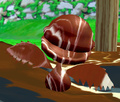
Piranha Plants, also called Pakkun Flowers,[13] appear in Super Mario Sunshine, only in Bianco Hills, and will attack Mario by popping-out of the ground and spitting black, white-spotted projectiles. They are defeated by spraying water with FLUDD inside their bodies until they blow up. In this game, their appearance is based off their appearance in Super Mario 64, as they have green lips (though most of them lack any form of teeth in their mouths). They also gain a new notable member, their leader Petey Piranha, a goop-spitting, giant, anthropomorphic Piranha Plant who appears twice as a boss in the game, and would go on to become a recurring character.
Proto Piranhas, Piranha Plant enemies created from the goop of the magic brush wielded by Bowser Jr., are also fought as mini-bosses in Super Mario Sunshine. After Mario sprays water on the generator, they come out and have to be defeated by shooting water at their mouths. Piranhabons, giant-sized goop-covered Piranha Plant heads, also appear as obstacles in Bianco Hills coming out of the goop. If Mario sprays water on them, they are revealed to look like Petey Piranha's head.
New Super Mario Bros.
In New Super Mario Bros., Piranha Plants return to their original attack pattern of popping-out of pipes and biting anything nearby. They are also found in the ground now, and if found on conveyor belts, they will move along with it. In New Super Mario Bros., Piranha Plants make chomping sounds. Aside from Piranha Plants, Venus Fire Traps make their return in New Super Mario Bros., while Super Piranha Plants also make their return from Super Mario Bros. 3; like certain normal Piranha Plants, the latter is exclusively seen outside pipes, as huge pipes do not make an appearance. They now require three fireballs instead of one to be defeated, and release eight coins when they do.
Super Mario Galaxy
Piranha Plants reappear in Super Mario Galaxy, trying to bite the player much like they did in New Super Mario Bros., but can be stunned if Mario fires Star Bits at them. They can be defeated by jumping on them, with a spin, or when run into as Rainbow Mario. They must sometimes be defeated to advance further, signaled by a Sproutle Vine growing where they once were. It is also notably the second game that Piranha Plants can be defeated in a single jump, after Super Mario 64 DS.
There is also a new, purple variation called Spiny Piranha Plant that is bigger and it attempts to slam its head into Mario. It can be defeated by hitting round bushes at it or by stomping it after it has slammed its head in the ground.
A Piranha Plant-like alien called Dino Piranha serves as a boss. It will chase Mario around its planetoid once woken from its egg. It can be defeated by Spinning to hit its tail, causing the tail to fly out, then get pulled back in and hit Dino Piranha. There is a separate, much more difficult black-colored version as well - its tail will often be on fire, so Mario can only attack it while its tail has gone out. It also runs faster and leaves a temporary trail of fire behind it. They both give the player a Power Star if defeated.
New Super Mario Bros. Wii
In New Super Mario Bros. Wii, Piranha Plants also appear as enemies along with Venus Fire Traps and Super Piranha Plants, and Munchers and Big Fire Piranhas make their return. Stalking Piranha Plants and River Piranha Plants also make their debut in this game. However, the pipe-planted Piranha Plants have lost their chomping sound effects from New Super Mario Bros. Piranha Plants can now be defeated with ice balls, although their ice blocks cannot be picked up. Additionally, Yoshi can jump on a Piranha Plant without getting hurt.
Super Mario Galaxy 2
Piranha Plants appear in Super Mario Galaxy 2, and they behave just as they did in the predecessor. In Supermassive Galaxy, pipe-dwelling Super Piranha Plants appear, and are invincible. There is now a new species of the Spiny Piranha Plant from the original, known as the Prickly Piranha Plant. To defeat it, Mario or Luigi must hit it with a plant when it slams its head onto the ground, as they cannot be stomped due to its prickles on its head.
The boss of the first galaxy, Sky Station Galaxy, is a baby, giant Piranha Plant named Peewee Piranha, whom is similar to Dino Piranha from the original. It is beaten by first spinning into the eggshell on its backside, then into its exposed rear once the eggshell is broken. After being hit a few times, the shell regenerates, and Mario must then attack it in this method again, but the boss is faster than before. Also, if the player confronts Peewee Piranha from the front, Peewee Piranha turns around. After hitting Peewee Piranha twice and defeating it, Mario is awarded with the first Power Star in the game. Also, in the Boss Blitz Galaxy, the player has to fight both of the Dino Piranhas from the game's predecessor.
Super Mario 3D Land
Piranha Plants appear in Super Mario 3D Land for the Nintendo 3DS. They act like they do in the Super Mario Galaxy series. There is also a new black variety called Inky Piranha Plants, which spit ink that covers the top screen, like a Blooper in the Mario Kart series. These Piranha Plants are also safe to stomp on to defeat. Fire Piranha Plants appear more often, however, and their fireballs can hit Goombas, Koopa Troopas, and other Piranha Plants.
New Super Mario Bros. 2
Piranha Plants appear in New Super Mario Bros. 2. Whenever Mario touches a Gold Ring, the Piranha Plants turn golden. Whenever the player defeats them when they are golden, the location they inhabited shoots out coins. A new species of Piranha Plant are also introduced, which are Bone Piranha Plants.
New Super Mario Bros. U
Piranha Plants appear in New Super Mario Bros. U. Big Piranha Plants reappear in both their modern and classic forms as well. In the level Blooming Lakitus, Lakitus throw spiked eggs called Piranha Pods that hatch into Piranha Plants instead of Spinies.
Super Mario 3D World / Super Mario 3D World + Bowser's Fury
Piranha Plants reappear in Super Mario 3D World and Super Mario 3D World + Bowser's Fury, where they act similarly to their appearance in Super Mario Galaxy and in later 3D Super Mario games. Potted Piranha Plants are also introduced, which can be picked up and used as items. This Piranha Plant can be used to eat enemies and obstacles, including other Piranha Plants. Another type of Piranha Plant, called the Piranha Creeper, is introduced, which has a long stem and can be defeated by knocking it back into its hole with attacks. Mega Piranha Plants also reappear in this game. Cat variants appear in Lake Lapcat.
Super Mario Maker / Super Mario Maker for Nintendo 3DS / Super Mario Maker 2
Piranha Plants reappear in Super Mario Maker and Super Mario Maker for Nintendo 3DS as enemies that the player can put into the course. If wings are attached to them, they behave similar to Jumping Piranha Plants, which replace Piranha Plants in the Super Mario World game style. Piranha Plants that are not found in pipes are stationary similar to Munchers. Big Piranha Plants, Fire Piranha Plants, Jumping Piranha Plants, Big Venus Fire Traps, and Munchers also appear in the game.
Piranha Plants and their variants reappear in Super Mario Maker 2, where they are able to be placed upside-down on ceilings. In the Super Mario 3D World style, they attack by lunging at the player, and can be defeated by being jumped on. Piranha Creepers reappear in the Super Mario 3D World style. Additionally, a Ninji Speedruns course called Yoshi's Piranha Plant Picnic features Piranha Plants, of which Yoshi must swallow twenty-five.
Super Mario Run
In Super Mario Run, Piranha Plants appear inside pipes, where they will periodically emerge to bite at the player. Like in most Super Mario titles, Piranha Plants will not emerge if the player is standing immediately nearby.
Super Mario Odyssey
In Super Mario Odyssey, regular Piranha Plants do not appear as enemies, and instead are used as flowers in Bowser and Princess Peach's marriage. They are also decorations on Bowser's ship in the opening scene. However, Fire Piranha Plants do appear as enemies, mostly in the Metro Kingdom. The game introduces a new variation, the Poison Piranha Plant, which is found in the Wooded Kingdom. They can be captured, but only if they are already stuck chewing on a rock (or possibly on another object), as they eat Cappy if their mouths are vacant. When captured, Mario gains control over them and can spit out poison/fire at will.
Super Mario Bros. Wonder
Piranha Plants, alongside Fire Piranha Plants, Big Piranha Plants, Big Fire Piranha Plants, Bone Piranha Plants, Munchers, and Nipper Plants, return in Super Mario Bros. Wonder, behaving as they did in previous games, except they now tilt their heads to the player.
The game introduces several new Piranha Plant species: Trottin' Piranha Plants,[14] variants that are able to leave their pipes and walk, similar to Ptooies and Stalking Piranha Plants, and can even walk along ceilings; Melon Piranha Plants, which resemble watermelons and spit seeds; Wonder Packun, black Piranha Plants with long stalks that appear after Bowser collects the Wonder Flower at the start of the game; Cloud Piranhas, dark Piranha Plants made of smoke that protect Bowser's Castle; and Note Piranha Plants (and their larger variants), fiery Piranha Plants resembling music notes that function as projectiles.
DIC cartoons
The Super Mario Bros. Super Show!
- “Terrible tortellini! Look at those plumber-munching Piranha Plants!”
- —Luigi, "Mario of the Deep"
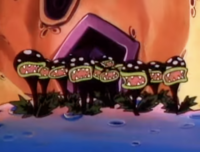
Piranha Plants (here misspelled as Pirhana Plants)[15] make several appearances in The Super Mario Bros. Super Show! Here, several possess the ability to spit fire, possibly assuming this ability from the Pansers of Super Mario Bros. 2, which do not appear in the show. They are depicted as being black with green lips and pink spots.
The Adventures of Super Mario Bros. 3
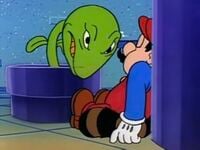
In The Adventures of Super Mario Bros. 3, one green Piranha Plant appears in "Sneaky Lying Cheating Giant Ninja Koopas". It bites Raccoon Mario after he is knocked unconscious by Big Mouth's reptile breath tornado move. It then attempts to bite Mario again, but it misses, as Mario moves out of the way in time. Their variants, Ptooies and Venus Fire Traps, appear in the show more often than regular Piranha Plants do.
Super Mario World
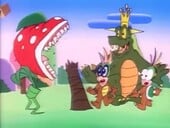
In the Super Mario World episode "Fire Sale", a non-antagonistic Piranha Plant (here misspelled as pirhana plant)[16] named Mama Fireplant appears, and Toadstool, Yoshi, Mario, and Luigi must rescue her from Kootie Pie in a frozen cavern, although ultimately only Yoshi is successful in doing so due to the Porcupinefish in the lair flash-freezing anyone who steps on them, with Mario, Luigi, and Toadstool all needing to be rescued themselves as a result.
In the episode "Gopher Bash," Cheatsy has his gopher minions replace the crops they had stolen with piranha plants, which Yoshi, Mario, and Luigi end up defeating. Unusually, one is depicted with hair or spike-like protrusions on its head.
In the episode "A Little Learning," Hip and Hop put a piranha plant in Oogtar's "eggabegga" project, only to have the sabotage turn on them and King Koopa when Oogtar inadvertently feeds it fertilizer.
Nintendo Comics System
In Nintendo Comics System, Piranha Plants make occasional appearances, and are depicted with primarily dark green heads atop light green stems. Some Piranha Plants have a pair of eyes, while female Piranha Plants have faces the same color as their stems and dark green lips, while the dark green and spotted portion is made from leaves and acts as "hair." In Piranha-Round Sue, several Piranha Plants, led by Piranha Sue, attempt to steal the Green Gecko Gem and a magic wand in order to depose Bowser, due to several tight restrictions he had placed upon them. In The Revenge of Pipe Ooze! a Piranha Plant gets strangled by Bowser after he calls Lemmy an idiot, while two female Piranha Plants appear as fans of Dirk Drain-Head, of whom Mario was cosplaying as.
Nintendo Adventure Books
After being led astray by a disguised Koopa on his way back to the Mushroom Palace in Double Trouble, Toad becomes stuck in a patch of Piranha Plants. After hearing Toad's yells for help, Mario rushes into the patch to rescue him, and tries to fight off a particularly large Piranha Plant by throwing a rock, which the plant bats aside with a stick, giving its brethren the idea of grabbing some clubs to use as weapons as well. Depending on how the accompanying puzzle is solved, the plants either fight each other after Mario tricks one into bludgeoning another, or they succeed in knocking Mario out with a blow to the head.
In Leaping Lizards, a patch of Piranha Plants, which Morton, Luigi and Toad navigate their way through on the way to Water Land, is growing near the Mushroom Palace. In Koopa Capers, Luigi spots some Piranha Plants among the army of monsters in Wendy O. Koopa's secret camp in the Magma Pits.
In Pipe Down!, Mario and Luigi run through a patch of Piranha Plants if they decide to give chase to Princess Toadstool, who is being forced to venture through the Koopahari Desert by a pair of enchanted basketball sneakers. Later, it is revealed that Ludwig von Koopa has coerced four Piranha Plants (named Ashby, Justin, Scott and Todd) to act as the string quartet in his basketball-based ballet "starring" the princess. If the Piranha Plants attack the Mario Bros. and the princess, Luigi easily defeats them by knocking their pots over. In one the book's bad endings, a pair of Piranha Plants will eat Mario and Luigi if they decide to rush into the leftmost pipe in a chamber.
In Flown the Koopa, while avoiding some Dino Rhinos in a forest, Mario pulls the Mushroom King away from a young and hungry Piranha Plant the bumbling monarch stumbles near.
In the final book, Brain Drain, Iggy Koopa's Synapse Switcher swaps the minds of some traffic officers and Piranha Plants, resulting in widespread havoc on the Fungus Freeway.
Yoshi
Piranha Plants make an appearance as one of the six falling objects in Yoshi. Piranha Plant's sprite in this game is similar to Jumping Piranha Plant from Super Mario World.
Mario Kart series
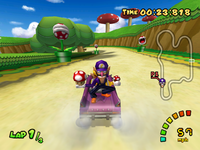
In the Mario Kart series, Piranha Plants often appear as road obstacles, sometimes being stationary on the track or in pipes off of the track, chomping racers that get too close.
Super Mario Kart
Piranha Plants appear in both of the Choco Islands in Super Mario Kart where they are planted offroad, acting as an obstacle. If the player hits the Piranha Plants, they will spin out.
Mario Kart 64
In Mario Kart 64, Piranha Plants return with a different appearance. They do not come out of pipes, but they are sitting on the ground. They appear to be moving their lips up and down, similarly to a sucking motion. The lips are also a yellowish tan color. They appear on Mario Raceway and Royal Raceway.
Mario Kart: Super Circuit
In Mario Kart: Super Circuit, Piranha Plants appear from within the quicksand pits of Yoshi Desert. If a racer falls into one of these pits, they will get pulled under, followed by the Piranha Plant chewing them repeatedly before spitting them out.
Mario Kart: Double Dash!!
In Mario Kart: Double Dash!!, Piranha Plants appear in Mario Circuit and in Yoshi Circuit. Here, they will stay in their pipe. When any driver gets close to them, they will try to bite the driver. Anyone who gets bitten by a Piranha Plant will flip over and the thrower will end up getting dragged behind the kart. Piranha Plants can be stunned by using a projectile such as a Green Shell or a Bowser Shell and they will also get stunned by anyone who used a Star. A species known as the Pit Plant also appears in the quicksand pit in Dry Dry Desert.
The chomping noises the Piranha Plants make in this game are Petey Piranha's voice sped up. They also make the same sound as Petey Piranha does when hit by an item.
Mario Kart Arcade GP series
In both Mario Kart Arcade GP and Mario Kart Arcade GP 2, the Piranha Plant is one of Princess Peach's special character items. The Piranha Plant's function in both games is that of eating the items of Peach's opponents once it is summoned by her. This Piranha Plant is differentiated by its bright pink coloration (possibly in reference to Peach herself).
Mario Kart DS
Piranha Plants return in Mario Kart DS, behaving like they did in Super Mario Kart, stationary and usually offroad. They appear in Mario Circuit, SNES Choco Island 2, and GCN Yoshi Circuit, with the third having removed the Piranha Plants in pipes in favor of the stationary ones.
Two Fire Piranha Plants also appear as obstacles on Mario Circuit. These Piranha Plants sit in their pipes, and breathe fireballs that bounce across the track, which can cause racers to spin out.
Mario Kart Wii
In Mario Kart Wii, N64 Mario Raceway and GCN Mario Circuit return along with their respective Piranha Plants. Additionally, there is a kart called Piranha Prowler, though it is based more on Petey Piranha than a regular Piranha Plant, due to its petals and colored lips on the kart.
Mario Kart 7
In Mario Kart 7, two large Piranha Plants appear in the courses Music Park and Piranha Plant Slide. In Music Park, they dance in place to the beat, and will attempt to bite racers that touch the spotlight in front of them. Their positions also switch from the right side of the track to the left and vice versa when enough time has passed. On Piranha Plant Slide, they are positioned in the center of the track and will periodically change the direction they are facing, attempting to bite racers that get too close to them. Getting bitten causes the racer to flip out.
Mario Kart 8 / Mario Kart 8 Deluxe
In Mario Kart 8, the potted Piranha Plant from Super Mario 3D World appears as an item. The Piranha Plant will attack nearby racers, as well as coins or any items on the ground, giving the user a speed boost every time it lunges forward. The item is time-based, and a small portion is cut off whenever the plant lunges forward, either at regular 2-second intervals, or by manually chomping. The Piranha Plant's pot features tiny wheels for it to move. When the player does a trick, the Piranha Plant will spin, doing a trick of its own. If it or the player gets hit with an item or hazard, it will be stunned for a bit. Piranha Plants are able to eat Bloopers before they spray their ink onto the screen.
Piranha Plants are also used in Renegade Roundup, a battle mode found exclusively in the game's Nintendo Switch port, Mario Kart 8 Deluxe. In that mode, the Piranha Plants have a strobe light on top of their head, and are used by the 'police' players to capture the 'criminal' players on the other team. As either team can be Red or Blue, blue Piranha Plants appear in this mode to match.
As obstacles, Piranha Plants appear as both the pipe variant and the more stationary ground variant. The pipe variants appear in Sweet Sweet Canyon (where they are pink in color), Mario Circuit, and GCN Yoshi Circuit, where they face in one direction, making them similar to their Mario Kart: Double Dash!! behavior; and in 3DS Piranha Plant Slide and 3DS Music Park behaving the same way as in Mario Kart 7. The stationary variants can be found on N64 Royal Raceway and, in the Mario Kart 8 Deluxe – Booster Course Pass, Tour Bangkok Rush and DS Mario Circuit, as well as in the background of Shy Guy Falls, 3DS Piranha Plant Slide and Piranha Plant Cove. In the Booster Course Pass, non-piped variants that behave like the pipe variants appear in Keukenhof in the third section of Tour Amsterdam Drift, the first section of Piranha Plant Cove and the museum section in the first section of Tour Madrid Drive, while one appears in Yoshi's Island attached to the underside of the tree trunk arch before the water section, similar to how Piranha Plants may be positioned in Super Mario World 2: Yoshi's Island, even using the same sound effects from that game.
In Electrodrome, Raving Piranha Plants appear as obstacles, dancing to the beat and behaving like the ones on Music Park. In Bone-Dry Dunes, a Bone Piranha Plant appears and behaves like the pipe variant. In Hyrule Circuit, Piranha Plants are replaced by Deku Babas, of which two appear. In the Booster Course Pass, Big Piranha Plants that behave like the Piranha Plant in 3DS Piranha Plant Slide appear in Tour Paris Promenade and DS Peach Gardens, Ptooies appear in GBA Riverside Park, Fire Piranha Plants return in DS Mario Circuit, and Mecha Piranha Plants return in GCN Waluigi Stadium. Wooden cutouts of Piranha Plants also appear in Tour Paris Promenade, Ninja Hideaway and Wii Daisy Circuit.
Mario Kart Tour
Piranha Plants return again in Mario Kart Tour as obstacles, in both their lunging and passive variants. They are found in many courses in the game, especially in T variants of courses. They act the same as in Super Mario Kart and Mario Kart 7. Hitting Piranha Plants with the use of an item or while invincible grants the player some bonus points. There are also wooden cutouts of Piranha Plants, which are used to block certain shortcuts. A new glider called the Piranha Plant Parafoil is also introduced. The Piranha Plant Tour is themed around Piranha Plants, with Petey Piranha and Piranha Plant Slide returning in this tour. This game also introduces two new courses themed around Piranha Plants, called Piranha Plant Cove and Piranha Plant Pipeline respectively. Inky Piranha Plants also make their debut in this game, appearing in the course Bangkok Rush.
Below are two lists of courses in Mario Kart Tour that feature Piranha Plants: one list is for the lunging type, and the other for the passive type. (Select "show" to reveal a list.)
- Lunging variant
- SNES Donut Plains 1 (Steer Clear of Obstacles), R/T
- SNES Ghost Valley 1R, R/T
- SNES Mario Circuit 2R/T
- SNES Choco Island 1 (Steer Clear of Obstacles), T
- SNES Ghost Valley 2 (Glider Challenge), R/T
- SNES Choco Island 2T, R/T
- N64 Mario Raceway R
- N64 Royal Raceway (Steer Clear of Obstacles)
- GBA Luigi Circuit T
- GBA Sky Garden T
- GCN Baby Park (Steer Clear of Obstacles)
- GCN Waluigi Stadium T
- GCN Yoshi Circuit, R, R/T
- DS Luigi's Mansion (Steer Clear of Obstacles)
- DS Shroom Ridge, R
- DS Mario Circuit R/T
- DS Peach Gardens, R
- Wii Coconut Mall (Steer Clear of Obstacles)
- 3DS Mario Circuit (Steer Clear of Obstacles)
- 3DS Piranha Plant Slide, R, T, R/T
- Paris Promenade, R, T, R/T
- Paris Promenade 2, R, T
- Paris Promenade 3, R, T
- Los Angeles Laps 3R/T
- Vancouver Velocity 2R/T
- Berlin Byways 3
- Amsterdam Drift 3, R/T
- Piranha Plant Cove 2, R/T
- Yoshi's Island, T
- Piranha Plant Pipeline, R, T, R/T
- RMX Mario Circuit 1 (Glider Challenge), R/T
- RMX Choco Island 1R/T
- RMX Choco Island 2, R, T, R/T
- RMX Rainbow Road 1R/T
- RMX Rainbow Road 2T, R/T
- RMX Ghost Valley 1T
- Passive variant
- SNES Donut Plains 1 (Steer Clear of Obstacles)
- SNES Choco Island 1R, T
- SNES Mario Circuit 3 (Do Jump Boosts)
- SNES Choco Island 2, R, T, R/T
- N64 Kalimari Desert (Steer Clear of Obstacles)
- N64 Mario Raceway, R
- N64 Royal Raceway, R, T, R/T
- GBA Peach Circuit (Steer Clear of Obstacles)
- GCN Baby Park (Steer Clear of Obstacles)
- GCN Yoshi Circuit (Steer Clear of Obstacles)
- DS Luigi's Mansion (Steer Clear of Obstacles)
- DS Mario Circuit, R, R/T
- 3DS Mario Circuit (Steer Clear of Obstacles)
- 3DS Piranha Plant Slide T, R/T
- New York Minute (Steer Clear of Obstacles)
- Paris Promenade 2R
- Berlin Byways 2 (Steer Clear of Obstacles)
- Piranha Plant Cove 2, R, T, R/T
- Piranha Plant Pipeline, R, T, R/T
- RMX Mario Circuit 1, R, T
- RMX Choco Island 1, R, T, R/T
- RMX Choco Island 2, R, T, R/T
Mario Kart Live: Home Circuit
Piranha Plants reappear in Mario Kart Live: Home Circuit as obstacles in Piranha Paradise, occasionally appearing on gates and snap at the players as they drive by, being held in their mouths for some time if caught.
Wario Land: Super Mario Land 3
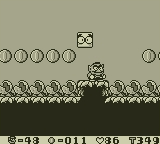
Piranha Plants are found again in Wario Land: Super Mario Land 3, where they behave differently than in past games. They inhabit various locations of Parsley Woods and act just like Munchers, in that they crowd pits and craters and are completely stationary. They are also indestructible and capable of defeating Wario instantly upon contact.
Although never referred to with their English names in Wario Land-related material, these enemies are labeled as "Pakkun Flower" (パックンフラワー) on page 6 of the KC Deluxe manga, volume 24, which is the Japanese name for Piranha Plants. Nintendo Power instead gives the uncapitalized name "piranha plant" to the Munchers on Rice Beach.[17]
Mario's FUNdamentals
In Mario's FUNdamentals, Piranha Plants appear as a suit of playing cards in Go Fish.
Yoshi's Island series
Super Mario World 2: Yoshi's Island / Yoshi's Island: Super Mario Advance 3
In Super Mario World 2: Yoshi's Island, Piranha Plants are known as variously as Wild Piranhas,[18] Wild Piranha Plants,[19] Red Piranhas,[20] Piranha Plants,[19] or simply Piranhas,[21] and Red Flowers.[22] They are drastically changed; instead of being rooted in pipes, Piranha Plants are found planted in the ground. Instead of attacking at intervals, Piranha Plants simply wait in a miniaturized form, growing larger and lunging at a Yoshi if approached. Also, instead of simply trying to bite Yoshi, they will eat him and then spit him out, causing him to lose Baby Mario and his Yoshi Eggs. They cannot be jumped on or swallowed, so they must be defeated with eggs or by spitting an enemy at them. Defeating them causes their heads to flip backwards, followed by them withering.
Super Mario World 2: Yoshi's Island also has a Piranha Plant boss named Naval Piranha, who is grown gigantic in size by Kamek's magic. Hootie the Blue Fish, an indigo variant that can fly with its propeller-like leaves and has serrated lips instead of teeth, makes its debut in this game, alongside the Wild Ptooie Piranha, a powerful, green Needlenose-spitting variant. The Blow Hard enemy resembles a Piranha Plant, but itself is actually a type of Pokey. Nipper Plants also appear as enemies in Super Mario World 2: Yoshi's Island; here, Nipper Plants are usually spawned from Nipper Spores, which Naval Piranha is capable of spitting.
Yoshi's Island DS
In Yoshi's Island DS, Piranha Plants once again appear as common enemies, along with Wild Ptooie Piranhas, Nipper Plants and Nipper Spores, and act just as in Super Mario World 2: Yoshi's Island. Several new Piranha Plants also appear, such as Polterpiranhas, Bungee Piranhas and Nipper Dandelions, along with a Piranha Plant boss named Big Bungee Piranha. The Piranha Plants in the Island Museum can be defeated.
Yoshi's New Island
Piranha Plants return in Yoshi's New Island, where they act similarly to how they did in the predecessors, one difference being that they are never found in a miniature state. Most of the Piranha Plants in the game are rooted in the ground, but several ones in the level Spin-Lift Drift come in and out of pipes like in the 2D Super Mario games.
Super Mario RPG: Legend of the Seven Stars
- “It's really weird. Sometimes I hear the guy next door. He's always mumbling about a Crystal-this and an Evil-that. Isn't a "Crystal" some kind of a shiny rock...or something? I know I've seen those somewhere!”
- —Piranha Plant, Super Mario RPG: Legend of the Seven Stars
In Super Mario RPG: Legend of the Seven Stars and its remake, Piranha Plants appear as enemies in the Pipe Vault, where they try to ambush Mario by leaping from a pipe. They have root-like legs, allowing them to walk; despite this, they are found exclusively in pipes outside of battle. Perhaps in reference to their immunity to being jumped on in earlier Super Mario games, the Piranha Plants in this game are completely immune to Mario's jump attacks.
Later on in Bean Valley, green and purple-colored Piranha Plants named Chewies appear. Additionally, Smilax, a Piranha Plant, is Bean Valley's multi-phase boss.
Nipper Plants, renamed Chompweeds, also appear as coin-stealing obstacles in the Pipe Vault and were set to appear as fightable enemies, but were removed from the final game.
There is a Piranha Plant living at Monstro Town in the game, where when talked to, he talks about someone next door "mumbling about a Crystal-this and a Crystal-that", alluding to Culex.
Tetris Attack
In Tetris Attack, only Naval Piranha appears as a boss and minion of Kamek and Bowser, aiding them in their plot of brainwashing the inhabitants of Yoshi's Island.
Yoshi's Story
In Yoshi's Story, Piranha Plants have spike-covered stalks and are shown to be capable of growing to huge proportions, somewhat resembling Naval Piranha. Their teeth also appear to be on their lips. The game has also introduces several other variations of Piranha Plants, such as the flying Piranha Pest and the grounded Piranha Sprouts. Piranha Plants commonly appear in Piranha Grove. When hit by an egg, these giant Piranha Plants fall over with a sound like a falling tree.
Super Smash Bros. series
- SmashWiki article: Piranha Plant

Piranha Plants appear in all entries of the Super Smash Bros. series, except for Super Smash Bros. Melee. The Mushroom Kingdom stage that appears in Super Smash Bros. and Super Smash Bros. Ultimate features Piranha Plants as obstacles that occasionally come out of the two pipes present there (with said Piranha Plants' appearances being based on that of the red Piranha Plants in Super Mario Bros.: The Lost Levels), dealing damage to any fighter that touches them; however, they can be attacked and knocked out easily. In Super Smash Bros. Brawl, a Piranha Plant is featured as a sticker and a trophy, and in the PictoChat stage, one of the drawings that appears in the background is a Piranha Plant. A Piranha Plant is also featured as a trophy in Super Smash Bros. for Nintendo 3DS and Super Smash Bros. for Wii U.
Super Smash Bros. Ultimate
| Super Smash Bros. fighter Piranha Plant |
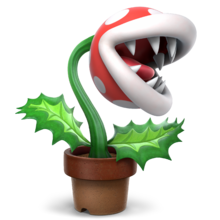
|
| Game appearances |
|---|
| Super Smash Bros. Ultimate (downloadable) |
| Special moves |
| Neutral: Ptooie Side: Poison Breath Up: Piranhacopter Down: Long-Stem Strike Final Smash: Petey Piranha |
| Battle entrance |
| Piranha Plant emerges from its pot/pipe. |
- SmashWiki article: Piranha Plant (SSBU)
A Piranha Plant also appears as a playable DLC character in Super Smash Bros. Ultimate, released on January 29, 2019. This makes Piranha Plant the first playable character to be a generic enemy and the first time overall a generic Piranha Plant is playable in any game. It was available for free post-launch for anyone who registered the game through My Nintendo by January 31, 2019 (PST), and it can be purchased separately as of February 1, 2019 (PST).
In the reveal trailer, various Yoshis are left dazed alongside Luigi and a Green Shell, while Mario approaches the Piranha Plant confidently, only for it to knock him back and then repeatedly bite into the air before showing its splash artwork with the tagline "Piranha Plant Pipes Up!" ("Piranha Plant Joins the Battle!" in the British English version).
Its attacks are based around several forms of the enemy, such as: transforming into a Prickly Piranha Plant to perform a headbutt for its forward smash; shooting spiked balls akin to a Ptooie; stretching like a Stalking Piranha Plant; being able to spew a cloud of poison that constantly damages other fighters, in a similar vein to a Putrid Piranha; spitting an explosive fireball like a Fire Piranha Plant as an aerial attack; and using its leaves as propellers to fly around like Jumping Piranha Plants. Additionally, its Final Smash involves summoning Petey Piranha, who traps opponents in the cages from The Subspace Emissary, then breathes fire at the cages and slams them down. Piranha Plant's other attacks are comprised of bites, headbutts, leaf swipes, and pot strikes.
Piranha Plant is one of the heavier fighters in the game, being heavier than Samus, Dark Samus, Bowser Jr. (and the Koopalings), and Terry, but lighter than Kazuya. Its mobility is also below-average in many areas, apart from its dashing speed. Piranha Plant was originally intended to have three jumps, but the third jump was removed prior to the fighter's release.[23]
Some of Piranha Plant's attacks have names: its forward tilt is Push and Pull, its forward smash is Prickly Swing, its back aerial is Fire Breath, and its down aerial is Flowerpot Meteor.
Its various alternate colors reference the various Piranha Plant types throughout the franchise, as well as, to a lesser extent, certain warp pipe types:
- Its green costume is derived from how it appeared in the original Super Mario Bros. and The Lost Levels, with a green warp pipe.
- Its yellow costume is derived from various Piranha Plants that have a yellow color, including the Pipe Land king's transfigured form, the Wild Ptooie Piranha from Yoshi's Island upon the first strike, and the Glad P. Plant from Super Princess Peach, with a magenta pot.
- The magenta costume resembles an active Piranha Creeper from Super Mario 3D World, Dino Piranha, Peewee Piranha, and the Super Mario All-Stars appearance of Nipper Plants, with a dark navy pipe.
- The black costume resembles the Inky Piranha Plant from Super Mario 3D Land and the Pale Piranha from Paper Mario: The Thousand-Year Door, with a red pot.
- The white costume resembles Bone Piranha Plants as they appear in New Super Mario Bros. 2, but with a pale green stem instead of a black one and white lips instead of the pale blue color they usually have, with a yellow pipe. Its all-white appearance with a green stem may also be a reference to Nipper Plants.
- The indigo costume with pink lips resembles the Bungee Piranhas from Yoshi's Island DS, Spiny Piranha Plants from Super Mario Galaxy, and to a lesser extent, Mom Piranha when colored blue, as well as her blue-colored Piranha Plants prior to and during her boss fight in Mario & Luigi: Superstar Saga and its remake. It is in a goldenrod, metallic pot.
- Its blue costume resembles how its sprite appears in underground courses in Super Mario Bros. and The Lost Levels, as well as the Frost Piranha from Super Paper Mario, and has a brown pipe.
Piranha Plant shares its victory theme with Bowser and Bowser Jr. In Piranha Plant's second victory pose, Mario is featured running towards it and then attempting to jump over it, only for Piranha Plant to bite Mario and launch him away, smiling after he is gone. Piranha Plant is more expressive than in most of its other appearances, smiling or scowling for certain actions. Also, Piranha Plant shares the trait of lacking any voice clips (or sound effects serving as voice clips as with Bowser, Samus, and R.O.B.) with Olimar (and Alph), Villager, Isabelle, Mega Man, and Pac-Man, and is the only Super Mario character with this trait. Shortly after the release of the version 2.0.0 update, it had been reported that playing as Piranha Plant in All-Star Smash can corrupt save data.[24] The Palutena's Guidance conversation on Piranha Plant reveals that Viridi is very knowledgeable on the Piranha Plant species, having written a thesis on it and being able to list off the many different derived species, irritating both Pit and Palutena.
Due to its status as a DLC fighter, Piranha Plant is not fought at any point in the World of Light Adventure mode, and it is not used as an opponent fighter in any spirit battles. Rather, Piranha Plant can be made available to play as in World of Light (if the player has downloaded it) by freeing 10 fighters in the mode. If Piranha Plant is downloaded with this criteria having been met beforehand, then Piranha Plant is immediately unlocked in World of Light the next time the player enters the mode.
"Piranha Plant" is incorrectly uncapitalized in the tip describing its appearance in the Mushroom Kingdom stage.
Classic Mode route
Piranha Plant's Classic Mode has it fight against all of Super Smash Bros. Ultimate's base newcomers, as well as Rathalos from Monster Hunter, who is also new to the series.
| New Bloom | ||||
|---|---|---|---|---|
| Round | Opponent(s) | Rule | Stage | Song |
| 1 | Inkling ×8 | Horde Battle | Moray Towers (Battlefield) | Splattack! (original) |
| 2 | Ridley, Dark Samus | Norfair | Vs. Ridley | |
| 3 | Simon, Richter | Dracula's Castle | Vampire Killer | |
| 4 | King K. Rool, Chrom | Free-for-All | Pirate Ship | Gang-Plank Galleon |
| 5 | Isabelle, Daisy | Smashville | Tour - Animal Crossing: New Leaf | |
| 6 | Incineroar, Ken | Free-for-All | Boxing Ring | The Battle at the Summit! |
| Final | Rathalos | Roar/Rathalos | ||
Mario Party series
Piranha Plants are featured quite prominently in the Mario Party series, often as obstacles in minigames. Until Mario Party 7, the Mario Party Piranha Plants were based on the species' appearance in Super Mario 64, as evidenced by their green lips, which were switched to white in Mario Party 7. In the first three games, most Piranha Plants seen are tripedal; they walk on three leg-like roots.
Mario Party
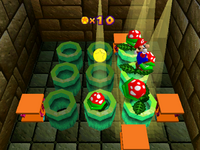
In Mario Party, Piranha Plants can be planted by players in the Peach's Birthday Cake board; players that stop on the plant's spot lose a Star. A legged Piranha Plant chases the solo player in the 1-vs-3 minigame Piranha's Pursuit, and a giant one is found in Tug o' War. Additionally, the minigame Whack-a-Plant involves stomping Piranha Plants which pop out of Warp Pipes. Piranha Plants are also part of the audience in Mario Bandstand.
Mario Party 2
A Piranha Plant that appears in Mario Party 2, appears in Mini-Game Park and is constantly chasing a butterfly without stopping. After the player buys a certain number of minigames from Woody, the Piranha Plant congratulates the player for their hard work and gives the player the minigames Dungeon Dash and Rainbow Run; after the latter, it leaves the Mini-Game Park, never to be seen again. A Piranha Plant can also be seen in the background in Bowser Land next to three red Warp Pipes. Two Piranha Plants can be seen inside glass domes in Space Land. In the minigame Toad in the Box, a Piranha Plant is one of four possible results when hitting the rotating block. If it is gotten, the player will be stunned temporarily.
Mario Party 3
In Mario Party 3, Piranha Plants appear on Waluigi's Island. A spiked Piranha Plant appears in the background of the minigame Vine with Me, possibly Naval Piranha. Piranha Plants also appear in the minigame Storm Chasers, where players must water their Piranha Plants by chasing a moving cloud.
A Piranha Plant is also one of the partners in the game's Duel Mode, and is Waluigi's default partner. It has an attack power of 3, one health point, and a salary of five coins. Its ability allows it to occasionally give the player an extra die with a 1-3 on it to roll after rolling. Two Piranha Plants appear in the item minigame Winner's Wheel, watching the player. If the player wins, the Piranha Plants will dance.
Mario Party 4
Although Piranha Plants do not appear in any boards or minigames, or as an item in Mario Party 4, they make a few small cameos; one is in the background of the Option Room, acting as the speakers for the sound test, another is part of one of the Bowser Bath, one of Waluigi's presents acting as the Showerhead.
Mario Party 5
In Mario Party 5, the minigame Pop-Star Piranhas presents five dancing Piranha Plants. The players must find out the one that is dancing differently from the others. The Piranha Plant Capsule makes its first appearance in this game. Any player who lands on a space containing the capsule loses half of their coins. Two Piranha Plant statues also appear in Bowser Nightmare. In Super Duel Mode, the Piranha Plant is a weapon the player can use. In Triple Jump, a Piranha Plant is located at the 150 foot/50m sign.
Mario Party 6
The minigame Odd Card Out from Mario Party 6 contains cards with Piranha Plants printed on them. Three Piranha Plants appear in the Solo Mode board Thirsty Gulch, dancing similarly to the Piranha Plants in Pop-Star Piranhas from Mario Party 5. The Piranha Plant Orb reappears as an orb that can only be placed on a space. Any player who lands on it will lose half of their coins and give them to the owner of the space. Piranha Plants also appear as obstacles in Mole-it!, where they try to hinder the players' progress by chomping on them. Two Piranha Plant-shaped lamps appear next to Bowser's table in Seer Terror.
Mario Party Advance
- “Piranha Plants. They're healthy and pretty!”
- —Narration, Mario Party Advance
In Mario Party Advance, a patch of Piranha Plants (labeled simply as "Piranha Plant" on the map) appears at an oasis in the desert area. One can be picked after Bob-omba requests a "healthy, pretty" flower and hints that such a flower can be found in the desert. Once the Piranha Plant is plucked, it starts to bite at the player, but nevertheless gets collected. It is then delivered to Bob-omba, who is excited with her new "cute and deadly" flower. The epilogue states that the Piranha Plant has grown much larger while still being healthy and dangerous, to Bob-omba's displeasure.
Several Piranha Plants also appear as enemies in the minigame Go-go Pogo, and a few appear in Match 'Em as well.
Mario Party 7
The Piranha Plant Orb returns unchanged from Mario Party 6 in Mario Party 7. In Herbicidal Maniac, the goal is to shoot down all Piranha Plants before the opponent(s) do(es). Hitting a mine will result in more Piranha Plants appearing. Three Piranha Plant-shaped fountains appear in the background in the Waterfall Battle game mode. Four Piranha Plant statues appear in the background in Pyramid Scheme. If one team in Wingin' It gets 19 meters or higher, a Piranha Plant will appear out of the house's chimney.
Mario Party 8
Piranha Plants also appear in Mario Party 8. In DK's Treetop Temple and King Boo's Haunted Hideaway, they act as hazards and take 10 coins from the player, when they land on a particular ? Space. In the minigame Winner or Dinner, they appear as enemies along with Spiny Eggs, biting the players and tossing them out of the oasis. A Piranha Plant is one of the hidden enemies in Specter Inspector.
Mario Party DS
A Piranha Plant acts as the only non-Koopa boss in Mario Party DS. In the first stage of Story Mode, the plant is the boss enemy of Wiggler's Garden. The Piranha Plant is fought in the minigame Feed and Seed. After defeating the Piranha Plant, a Wiggler gives the player the first Sky Crystal.
Mario Party 9
Piranha Plants appear in minigames featured in Mario Party 9. In Speeding Bullets, they get out of Warp Pipes and can slow down the Bullet Bills when both collide. In Piranha Patch, Piranha Plants grow from normal flower buds and take one point from the players they attack. They also appear as hazards in Wiggler Bounce. Piranha Plants are also found in red Warp Pipes next to Unlucky Spaces where they take the captain down in a cavern with six Mini Ztar Spaces.
The Piranha Plant is also given a constellation, named "Gluttonous Gobbler."
Mario Party: Island Tour
Piranha Plants appear in Mario Party: Island Tour as obstacles that the player must avoid in the minigame Quickest Cricket. Two also appear in one of the scenes depicted in Get Reel.
Mario Party 10
Piranha Plants reappear in Mario Party 10 in the Mushroom Park board, as well as in minigames such as Pipe Sniper. Additionally, Golden Piranha Plants also appear, and Petey Piranha appears as the boss of Mushroom Park; who is fought in the Boss Minigame, Petey's Bomb Battle.
Mario Party: Star Rush
Piranha Plants reappear alongside their gold counterparts in Mario Party: Star Rush as targets in the minigame Piranha Plantemonium.
Super Mario Party
Piranha Plants appear in Super Mario Party in the minigame Miner Setbacks as obstacles. They also appear in the Party Plaza initially, where they block Warp Pipes leading to locked game modes. Kamek removes the Piranha Plants with magic as the player completes requirements, making the pipes and by extension the minigames accessible.
Mario Party Superstars
Piranha Plants reappear on Peach's Birthday Cake in Mario Party Superstars, although they now only steal 5 coins from opponents that land on their spaces. In this game, they are now grown from Piranha Pods thrown by Lakitus. Big Piranha Plants grown from larger Piranha Pods replace the original Piranha Plant's function, stealing a Star from opponents that land on their spaces.
Paper Mario series
Paper Mario
In Paper Mario, Piranha Plants are found in Forever Forest. Unlike in Super Mario World 2: Yoshi's Island, where Piranha Plants are firmly rooted in place and unable to move, the Piranha Plants are shown to be able to move around freely; if a Piranha Plant is alerted to Mario's presence, it will burrow underground and suddenly "burst" to the surface near Mario and try to bite him as the First Strike. The Piranha Plants in this game have yellow teeth.
Two variations of Piranha Plants, the tropical Putrid Piranha and frigid Frost Piranha, are introduced in Paper Mario. These types are larger and face forward. The boss of Mt. Lavalava, a Lava Piranha, is also a gigantic, talking and flaming Piranha Plant.
Paper Mario: The Thousand-Year Door
Piranha Plants also appear in Paper Mario: The Thousand-Year Door and its Nintendo Switch remake. They appear as enemies, and four types are found. The standard type is found in Boggly Woods and the Great Tree, where it has adapted into a monochrome color to fit its unusual environment, similar to the Clefts in the same area. In the English localization, they are known as Pale Piranhas and identified by Goombella as a subspecies. However, every other language lacks this detail and states they are the same plants from Mario's previous adventures, although the Spanish localization has a color identifier in its name regardless. This was not fixed in the remake and the English localization continues to refer to them as Pale Piranhas (and it also was carried on in both Spanish versions). Additionally, in the game's English demo, they were treated as normal Piranha Plants.[25] Pale Piranhas act the same as the Piranha Plants in the previous game, though in the Great Tree they can move to higher and lower ground in rooms with multiple levels. In the Glitz Pit, a Pale Piranha appears as one of the members of The Mind-Bogglers. Normal-colored Piranha Plants also form part of the audience, joining in Boggly Woods once Pale Piranhas are encountered, though they can be seen sooner if fighting against Spanias in the western portion of Rogueport Underground.
Additionally, Putrid Piranhas and Frost Piranhas return from Paper Mario, now simply being recolors of Pale Piranhas. A new, powerful variety, simply called Piranha Plant, also appears. These Piranha Plants are colored the same as typical Piranha Plants, have extremely high HP and attack power, and only appear in the optional Pit of 100 Trials.
Super Paper Mario
Piranha Plants appear in Super Paper Mario. In this game, their normal versions appear in Lineland, Gloam Valley, and The Bitlands. They have yellow teeth just like they do in previous Paper Mario games, and they are described as "notorious" by Tippi. The Putrid Piranha and Frost Piranha return as well. They are much weaker in comparison to their previous appearances in the series, as they function more similarly to Piranha Plants in 2D Mario games.
Paper Mario: Sticker Star
Piranha Plants reappear in Paper Mario: Sticker Star, having more HP than their previous iterations. They first appear in World 3 as semi-common enemies, but later appear in World 5 as common enemies. Their appearance has not changed too much from the previous Paper Mario games, though they have white teeth rather than yellow and their leaves look like those from contemporary mainline games. Piranha Plants are very resilient in this game, due to having a lot of HP, are able to home in on Mario's direction outside battle, and guard ? Blocks to prevent Mario from getting the stickers. Piranha Plants can attack by biting Mario, as like in the other Paper Mario games. Piranha Plants also have a new attack to spit clouds of dust at Mario. The spit attack has low attack power but it can make Mario dizzy. They can also dig underground to dodge attacks for one turn so that way Mario's attacks would miss. Not even a POW Block will damage it in this state. Like the other Paper Mario games, Piranha Plants cannot be stomped on unless an Iron Jump sticker is used; this does not apply, however, if they are soggy, asleep or Crumpled. Fire Piranhas are also seen in this game. They are aided by enemies that have more than 10 HP which are Shy Guys, Snifits, Hammer Bros., Poison Bloopers, Spike Tops and Spear Guys. Two Piranha Plants also aid the third Wiggler Segment.
Paper Mario: Color Splash
Piranha Plants reappear in Paper Mario: Color Splash. They appear in Redpepper Crater and Mossrock Theater.
Paper Mario: The Origami King
Origami Piranha Plants appear in Paper Mario: The Origami King as enemies, in a section of the Spring of Jungle Mist. They attack by biting or spitting fireballs, and can only be jumped on with Iron Boots and their variants. During the lineup phase, they burrow under the ground while the spot they are on is selected, and reemerge once their spot is deselected. Origami Nipper Plants, Ptooies, and Jumping Piranha Plants also appear in the game, along with Paper Macho versions of Piranha Plants.
Mario Golf series
In the Mario Golf series, Piranha Plants appear in only two games. In Mario Golf: Toadstool Tour, a few Piranha Plants appear as obstacles on the Bowser Badlands course, where they dwell in pipes, and if the ball rolls into a Piranha Plant's pipe, it takes the ball and spits it out, likely causing it to fall into lava. In Mario Golf: World Tour, a Piranha Plant only makes a minor appearance during Nabbit's Double Bogey animation, hiding in his bag, so when Nabbit jumps in, he gets bitten by the Piranha Plant.
Mario & Luigi series
Mario & Luigi: Superstar Saga / Mario & Luigi: Superstar Saga + Bowser's Minions
Piranha Plants appear as enemies in the Beanbean International Airport in Mario & Luigi: Superstar Saga and its remake, where they grow on the landing strip and prevent the Toad Express from landing. Defeating them in battle will only cause them to respawn if Mario and Luigi leave the area and re-enter. To get rid of them for good, these Piranha Plants must be doused with water, and then Luigi must use Thunderhand to eliminate them.
A giant Piranha Plant named Mom Piranha acts as the boss of the area, hatching from an egg-like structure after all the Piranha Plants are removed. This Piranha Plant can shoot energy beams and change colors (and weaknesses), and summons Piranha Plants of the same color as it. Later on, a Piranha Plant named Piranha Bean appears as a mini-boss that has the ability to shrink anything it eats.
Minion Quest: The Search for Bowser includes lots of Piranha Beans as enemies, while Fire Stalking Piranha Plants appear as recruitable allies.
Mario & Luigi: Partners in Time
Though regular Piranha Plants do not appear in Mario & Luigi: Partners in Time, two new sub-species of them, called Elasto-Piranhas and Piranha Planets appear. Additionally, Petey Piranha also appears.
Mario & Luigi: Bowser's Inside Story / Mario & Luigi: Bowser's Inside Story + Bowser Jr.'s Journey
A cell-based variation of the Piranha Plant, the Piranha Plorp, appear in the Energy Hold in Mario & Luigi: Bowser's Inside Story and its remake. Two giant Piranha Plants are also located in Peach's Castle, and have to be defeated by Bowser by leaping up to their buds and bashing into them.
Mario & Luigi: Dream Team
Piranha Plants reappear as enemies in the Mario & Luigi series in Mario & Luigi: Dream Team, where they are located in the biggest Dreampoint of Dreamy Driftwood Shore. In the field when Mario and Dreamy Luigi are in the vicinity, Piranha Plants spit fire in the direction it faces upon coming out several times before retreating back into the ground to hide for a moment, repeating this process indefinitely on the same spot. If Luiginary Gravity is used, the Piranha Plants all retreat underground briefly as the gravity changes.
In battle, a Piranha Plant may spit a large fireball or a Fly Guy at Mario, who must jump over or idle under these respective objects to avoid taking damage. Piranha Plants may spit out Nipper Spores that become Nipper Plants who assist them in battle from the background. While the Nipper Plants are still alive, a Piranha Plant can spit a fireball towards them, which will bounce the fireball about until each Nipper Plant has touched the fireball, and the last one to touch it sends the fireball towards Mario, who must hammer it at the Piranha Plant to avoid taking damage.
Piranha Plants are weak to Fire attacks, and thus take critical damage from the Luiginary Flame.
Mario & Luigi: Paper Jam
In Mario & Luigi: Paper Jam, Piranha Plants do not appear themselves, but Fire Piranha Plants and their paper variant do.
Yoshi Topsy-Turvy
Piranha Plants appear in Yoshi Topsy-Turvy. Here, they are immobile and unable to be defeated. It holds Yoshi in its mouth for about three seconds and then spits him out if he goes into one of them.
Yoshi Touch & Go
Piranha Plants and Wild Ptooie Piranhas in Yoshi Touch & Go and have the same attack pattern in Super Mario World 2: Yoshi's Island, though they both take three eggs to defeat, changing color to indicate their health from green, yellow, to red. They both give a total of four points.
Super Princess Peach
Piranha Plants appear as rare enemies in Super Princess Peach. They act like how they did in Super Mario World 2: Yoshi's Island. They could be defeated with Perry or by using Rage, but could not be jumped on or picked up. Getting too close or attempting to jump on it results in Peach being swallowed and chewed on temporarily before being spit back out. There is also a new variety of them called Glad P. Plants, normal and Glad Ptooies, and normal and Sad N. Plants also appear in Super Princess Peach. There was also a reappearance of Petey Piranha, although he was called "Boss P. Plant" (short for "Boss Piranha Plant") in the American version of the game's glossary.
Mario Baseball series
In the Mario Baseball series, Piranha Plants appear in Mario Superstar Baseball and its sequel, Mario Super Sluggers. In both games, Piranha Plants are obstacles in Yoshi Park, where they will eat any nearby balls and spit them out in a random direction. Touching a Piranha Plant briefly stuns a fielder. In Mario Super Sluggers, a Piranha Plant can take a ball, go in the pipe, and transport it to another part of the field. In both games, Piranha Plants also appear in the Piranha Panic minigame, where players must hit colored Piranha Plants with eggs of matching colors, although purple Piranha Plants can be hit with any egg. In Mario Super Sluggers, the minigame instead has the player pitch the right balls into the Piranha Plants in order to score points while avoiding being stunned by it.
Mario & Sonic series
Piranha Plants appear in a few events in the Mario & Sonic series. Piranha Plants in Warp Pipes appear as obstacles in Ski Cross Racing in the Nintendo DS version of Mario & Sonic at the Olympic Winter Games, where they move horizontally in and out of the pipes and cause any characters that are hit to lose speed and Rings. In the Wii version, Piranha Plants in Warp Pipes similarly appear as obstacles in the individual and team versions of Dream Ski Cross, as well as in Dream Ice Hockey, where they occasionally bite at nearby characters and knock over any that hit them. In the Nintendo 3DS version of Mario & Sonic at the Rio 2016 Olympic Games, Piranha Plants in Warp Pipes appear as obstacles in BMX Plus, where they occasionally bite at the characters, and if hit, the character loses both speed and Rings. In the same game, Piranha Plants also appear in Golf Plus, although they do not affect the gameplay.
In the Nintendo 3DS version of Mario & Sonic at the London 2012 Olympic Games, a single Piranha Plant in a Warp Pipe briefly appears in the Story Mode bonus episode The Life of a Minion, where it is summoned by Magikoopa to stun Vector.
Captain Toad: Treasure Tracker
Piranha Plants reappear in Captain Toad: Treasure Tracker and its Nintendo Switch and Nintendo 3DS ports. They can be defeated by having turnips thrown at them, landing on their heads, or spinning into them.
Mario vs. Donkey Kong series
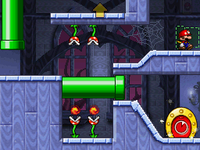
Piranha Plants, along with Fire Piranha Plants, appear in the Mario vs. Donkey Kong series, debuting in Mario vs. Donkey Kong: Minis March Again!. They also appear in Mario vs. Donkey Kong: Mini-Land Mayhem! in Construction Zone, Mario vs. Donkey Kong: Tipping Stars in Level 5-6, and Mini Mario & Friends: amiibo Challenge in Level 4. They do not generate fireballs, but if they receive a fireball from a Fire Piranha Plant, they spit it back shortly after, behaving just like their fire-shooting counterparts in this case. They are fixed to a surface and can destroy the Minis at a single touch, but can otherwise be defeated with Hammers, a Slope Slide or if hit by shooting a Mini from a Cannon.
Puzzle & Dragons: Super Mario Bros. Edition
Piranha Plants appear as common enemies in Puzzle & Dragons: Super Mario Bros. Edition that can also serve as an ally for the player. Its main attribute is Wood, with no sub-attributes. Its skill Piranha Drain turns all Water Orbs into Heart Orbs. Its awoken skill Wood Boost raises the ATK of all Wood attribute team members whenever a horizontal line of Wood Orbs is cleared.
Its HP and RCV are low and its ATK is below average. The player can transform a Piranha Plant into a Fire Piranha Plant by using four Fire Flowers on it. If the player instead uses four Poison Mushrooms, it will transform into a Bone Piranha Plant instead. Because the Piranha Plant is treated as a generic enemy, it can still be battled, even if the player has one in their party.
Yoshi's Woolly World / Poochy & Yoshi's Woolly World
Piranha Plants reappear in Yoshi's Woolly World and its Nintendo 3DS version. They lunge in the direction of Yoshi and munch air continuously, much like the Piranha Plants that do not dwell Warp Pipes from the New Super Mario Bros. games. When they are hit by a yarn ball, it ties them up, allowing a Yoshi to jump onto and defeat them. Like the other Yoshi games, making contact with a Piranha Plant will swallow a Yoshi and spit him out, taking some hearts from his health meter.
Mario + Rabbids series
In the Mario + Rabbids series, Piranha Plants physically appear in only Mario + Rabbids Kingdom Battle. They can be seen throughout the Flushy Forest section of Ancient Gardens, such as Piranha Plants with lamp-like fixtures, which lie on the sidetrack in dimly lit parts of the forest, a three-headed Piranha Plant statue in The Mystic Maze of Mysticism and Mazing, and a potted Piranha Plant that was merged with a Rabbid, becoming Pirabbid Plant. Additionally, one of Mario's Blaster weapons has a design based on a Piranha Plant. In Mario + Rabbids Sparks of Hope, a desk lamp resembling a Piranha Plant appears inside of the WM ARC.
Yoshi's Crafted World
In Yoshi's Crafted World, Piranha Plants are found on both Yoshi's path and in the backdrop. They can be defeated by smacking them with an egg. Background Piranha Plants are unable to hurt Yoshi. A large cardboard Piranha Plant named Spike the Piranha appears as the boss of Acorn Forest.
Dr. Mario World
Piranha Plants appear in Dr. Mario World as assistants. Their stage mode effect grants a chance that two viruses will be eliminated at the start of the stage, though viruses that require multiple hits won't immediately be eliminated. Their versus mode effect grants a chance that all capsules will be eliminated if an object has reached the third row from the bottom line (this can only happen once per match after it is activated). The chance that these effects activate increases at higher levels, where at the first level it is 30% for stage mode (5% prior to version 2.3.0) and 20% in versus mode, but at the maximum level it is 80% for stage mode (25% prior to version 2.3.0) and 100% in versus mode. Clinic Events featured a Piranha Plant as a patient during each of season 5 and the season 3 revisit
A Piranha Plant also appears as a playable doctor under the name Dr. Piranha Plant, released on December 16, 2020. Barring sub-species, this is the first Super Mario game a generic Piranha Plant is playable. Its skill in both stage mode and versus mode eliminates objects randomly, similar to Dr. Yoshi's skill. It is represented by pipes appearing, followed by the Piranha Plant emerging from the bottom-middle pipe and then biting. This skill prioritizes eliminating viruses, and will only target other objects if there are less viruses that this skill targets. The difference between Dr. Yoshi and Dr. Piranha Plant is that the amount of objects eliminated by the former is greater compared to the latter, but the skill meter charges slower. Capsules will only be targeted if other objects are not available.
Luigi's Mansion 3
Although Piranha Plants do not physically appear in Luigi's Mansion 3, figurines of them appear in the Hotel Shops in some of the stores.
Play Nintendo
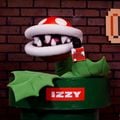
A Piranha Plant named Izzy is a co-host of The Play Nintendo Show, along with Andrew Trego. Izzy is a voiced puppet who remains within a Warp Pipe during the duration of the show, whose two leaves serve as arms. He has a role in providing comic relief and hosting supporting segments for the show, such as "Izzy News." Andrew says that Izzy gets a bit snappy before lunch.
The Super Mario Bros. Movie
Piranha Plants appear in The Super Mario Bros. Movie as a part of Bowser's army, where they have longer and thinner stems, more spots, and sharper teeth. Additionally, mechanical Piranha Plants appear on the Training Course used to train Mario.
Unused appearances
Super Mario Bros. film
Although Piranha Plants do not make an appearance in the Super Mario Bros. film, they were planned to appear, as concept art for them was found along with other scrapped enemies and an early script for the film.
Other appearances
The Legend of Zelda series
- Zelda Wiki article: Piranha Plant
Piranha Plants appear as semi-regular enemies in The Legend of Zelda series. First appearing in The Legend of Zelda: Link's Awakening and its rereleases, they are one of the few enemies to be directly from the Mario series. In the Nintendo Switch remake, a figure of one can be won in the Trendy Game after clearing the Eagle's Tower and placed in Marin and Tarin's house. The text that appears upon acquiring the figure reads, "You got a Piranha Plant figure! You know, the flower that pops out from the pipes." Piranha Plants are also very similar to Deku Babas, which first appeared in The Legend of Zelda: Ocarina of Time.
The Manhandla, a boss from the Legend of Zelda series, exhibits many traits akin to more traditional Mario series Piranha Plant variants.
Excitebike: Bun Bun Mario Battle
Piranha Plants appear throughout Excitebike: Bun Bun Mario Battle, decorating the sidelines of every track.
Nintendo Monopoly
A Piranha Plant appears as a utility in Nintendo Monopoly. It costs $150, and takes the place of the Electric Company.
Big Brain Academy
The silhouette of a Piranha Plant appears under the 3-Star difficulty of the "Get in Shape" minigame in Big Brain Academy.
Captain Rainbow
A single Piranha Plant also appears in Captain Rainbow in the garden of Lip's house. After Birdo, it is the second character of the Super Mario franchise that appears in the game, but it only has a minor role. The Piranha Plant is taken care of by the fairy Lip.
Sonic Lost World
Piranha Plants appear as enemies in the Yoshi's Island Zone DLC for Sonic Lost World. They more resemble how they appear in Yoshi's Island, with extremely large heads compared to their stems. The only way to defeat them is to kick a Shy Guy into them.
Animal Crossing series
Piranha Plants appear in the Warp Pipe furniture item in the Animal Crossing series. In Animal Crossing: New Horizons, they no longer appear in the Pipe item, though they can be seen emerging from the Warp Pipes in the animated mushroom mural wallpaper.
Minecraft
In the Super Mario Mash-up in Minecraft, Piranha Plants appears on Rose Bushes and Sculk Sensors. Piranha Creepers and Nipper Plants also appear.
Lego City Undercover
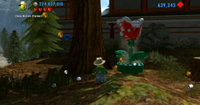
The player can grow a Piranha Plant in the Wii U and Nintendo Switch versions of Lego City Undercover. The Piranha Plant will shoot fireballs at the player.
Profiles and statistics
- Main article: List of Piranha Plant profiles and statistics
Most bios of Piranha Plants point out their plant-like characteristics and their tendency to bite down on objects. Some bios also mention certain derived species of Piranha Plant.
Super Mario RPG: Legend of the Seven Stars
| Super Mario RPG: Legend of the Seven Stars enemy | |||||||||
|---|---|---|---|---|---|---|---|---|---|
| Piranha Plant | |||||||||
| HP | 168 | FP | 4 | Speed | 6 | ||||
| Location(s) | Pipe Vault | Attack | 45 | Magic attack | 20 | ||||
| Role | Common | Defense | 14 | Magic defense | 22 | ||||
| Bonus Flower | Attack Up! (20%) | Yoshi Cookie | Sleepy Bomb | Morph rate | 75% | ||||
| Evade | 0% | Magic evade | 0% | Spells | None | ||||
| Weak | None | Strong | Jump | Sp. attacks | S'crow Dust, Pollen Nap | ||||
| Coins | 5 | Exp. points | 5 | Items | Maple Syrup (5%) | ||||
| Psychopath | "Pretty boring nowadays." | ||||||||
Super Paper Mario
| Super Paper Mario enemy | |||||||||
|---|---|---|---|---|---|---|---|---|---|
| Piranha Plant | |||||||||
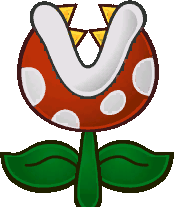
|
Max HP | 2 | Role | Common | Location(s) | Lineland Road (1-1), Gloam Valley (2-1), The Bitlands (3-1), Floro Caverns (5-3) | |||
| Attack | 1 | Card type | Common | ||||||
| Defense | 0 | Items | Horsetail, Fresh Veggie, Catch Card, Peachy Peach | Card location(s) | Card Shop; Catch Card/SP; Chapter 3-1: Found on a platform after jumping along the colored columns. | ||||
| Score | 100 | ||||||||
| Card description | This violent vine lurks in pipes, waiting for a snack. You'd be surly too if you lived in a pipe. | ||||||||
| List of Catch Cards 56 57 58 |
Tattle | This is a notorious Piranha Plant. It is a monstrous flower that lives in pipes... Max HP is 2 and Attack is 1. This strange weed will stay low if you cozy up to the side of its pipe... | |||||||
Mario & Luigi: Dream Team
| Mario & Luigi: Dream Team enemy | ||||||||
|---|---|---|---|---|---|---|---|---|
| Piranha Plant | ||||||||

|
HP | 222 | Role | Common | Level | 21 | Location(s) | Dreamy Driftwood Shore |
| Power | 146 | Position | Normal | No Hitter | 31 | |||
| Defense | 138 | World | Dream | Weakness | Fire | Item drop | Ultra Mushroom (5%) None (0%) | |
| Speed | 54 | Experience | 170 (204) | Coins | 30 (100%) | |||
Gallery
- For this subject's image gallery, see Gallery:Piranha Plant.
Media
| File info |
Additional names
Internal names
| Game | File | Name | Meaning
|
|---|---|---|---|
| Super Mario Galaxy Super Mario Galaxy 2 |
ObjectData/PackunPetit.arc | PackunPetit | Petit Piranha; compare with the game's "Packun Flower" |
| Super Mario Galaxy Super Mario Galaxy 2 |
StageData/ObjNameTable.arc/ObjNameTable.tbl SystemData/ObjNameTable.arc/ObjNameTable.tbl |
プチパックン (Puchi Pakkun) | Petit Piranha; the same as Nipper Plant |
Names in other languages
Piranha Plant
| Language | Name | Meaning | Notes |
|---|---|---|---|
| Japanese | パックンフラワー[26] Pakkun Furawā |
Katakana spelling of「ぱっくんちょ」(pakkuncho, a Japanese expression meaning "eating in one bite") and "flower"; officially romanized as "Pakkun Flower" or "Packun Flower" | |
| パックンフラワー(赤)[26] Pakkun Furawā (Aka) |
Piranha Plant (Red); variant from Super Mario Bros.: The Lost Levels | ||
| Chinese | 吞食花[?] Tūnshí Huā |
Swallowing Flower | Mario Tennis Aces onward |
| 食人花[?] Shírén Huā |
Human Eating Flower; obscure translation of the Japanese name | Prior to Mario Kart 8 Deluxe | |
| Dutch | Piranha Plant[?] | Piranha Plant | |
| Pakkunbloem[27] | Pakkun Flower | Super Mario Land | |
| Finnish | Piraijakasvi[?] | Piranha Plant | |
| French (NOA) | Fleur Piranha[?] | Piranha Flower | |
| French (NOE) | Plante Piranha[?] | Piranha Plant | |
| Fleur Pakkun[28] | Pakkun Flower | Super Mario Land | |
| German | Piranha-Pflanze[?] | Piranha Plant | |
| Schnapp-Piranha[?] | From schnappen ("to snap") and "Piranha Plant" | ||
| Pakkun-Blume[?] | From Japanese name | Super Mario Land instruction booklet | |
| Piranha-Kippa[29] | ? | Yoshi's Story | |
| Hungarian | Piranha növény[30] | ? | LEGO Super Mario |
| Italian | Pianta Pirana[sic][31] | Pirana Plant | |
| Pakkun Flower/Fiore pakkun[32] | Pakkun flower | ||
| Pianta carnivora[33] | Carnivorous plant | ||
| Pianta Piranha[?] | Piranha Plant | ||
| Korean | 뻐끔플라워[?] Ppeokkeum Peullawo |
From "뻐끔뻐끔" (ppeokkeum-ppeokkeum, onomatopoeia for opening and closing mouth repetitively) and "flower" | |
| Portuguese | Planta Piranha[?] | Piranha Plant | Also spelled "Planta-Piranha" and "Planta-piranha" (Super Mario 3D World) in the European Portuguese localization |
| Romanian | Plantă Piranha[?] | Piranha Plant | Super Mario World television series |
| Russian | Растение-пиранья[?] Rastenie-piran'ya |
Piranha Plant | |
| Spanish (NOA) | Planta Piraña[?] | Piranha Plant | Also spelled "planta piraña" in the Latin American Spanish localization from 2012 to 2019, when species names were always written in lowercase. |
| Planta Piraña gris[?] | Gray Piranha Plant | Paper Mario: The Thousand-Year Door remake | |
| Spanish (NOE) | Planta Piraña[?] | Piranha Plant | |
| Planta Piraña Gris[?] | Gray Piranha Plant | Paper Mario: The Thousand-Year Door | |
| Swedish | Pirayablomma[?] | Piranha Flower |
Upside-Down Piranha
| Language | Name | Meaning | Notes |
|---|---|---|---|
| Japanese | 逆さパックン[34] Sakasa Pakkun |
Upside-down Piranha (Plant) | |
| さかさパックン[?] Sakasa Pakkun |
|||
| Dutch | Omgekeerde Piranha[?] | Reverse Piranha | |
| Omgekeerde Pakkun[27] | Reverse Pakkun flower | Super Mario Land | |
| French (NOA) | Fleur Piranha renversée[?] | Reversed Piranha Flower | |
| French (NOE) | Plante Piranha renversée[?] | Reversed Piranha Plant | |
| Fleur Pakkun inversée[35] | Inversed Pakkun flower | Super Mario Land | |
| German | Kopfüber-Piranha-Pflanze[?] | Upside-down Piranha Plant | |
| Italian | Upside Down (Headstand) Pakkun[32] | - | |
| Pianta Piranha capovolta[36][37] | Upside-down Piranha Plant | ||
| Pianta Piranha a testa in giù[38] | Head-down Piranha Plant | ||
| Russian | Пиранья-перевертыш[?] Piran'ya-perevertysh |
Flipped-over Piranha | |
| Spanish (NOA) | Planta Piraña al revés[?] | Upside-down Piranha Plant | |
| Spanish (NOE) | Planta Piraña del revés[?] | Upside-down Piranha Plant |
References
- ^ Hiroo, Tochikubo (1987). How to win at Super Mario Bros.. Tokuma Shoten. ISBN 4-19-720003-XC. Page 14.
- ^ Yamashita, Tatsumi (1987). Tokuma Shoten. ISBN 999832369X. Page 30.
- ^ Spring 1991. NES Game Atlas. Nintendo of America (American English). Page 35.
- ^ "Pirana plants - Man eating plants that live in the flower-pots. They show their faces quickly and without warning, so watch out! You can't kill them by jumping on top of them." – 1985. Super Mario Bros. manual. Nintendo of America (American English). Page 14.
- ^ 1990. Super Mario Bros. 3 manual. Nintendo of America (American English). Page 40.
- ^ October 1993. Nintendo Magazine System (Australia) issue 7. Catalyst Publishing (Australian English). Page 23.
- ^ Tilden, Gail, et al. (June 1990). Nintendo Power Volume 13. Nintendo of America (American English). Page 9.
- ^ a b 1989. Super Mario Land instruction booklet. Nintendo of America (American English). Page 13.
- ^ a b 1991. Nintendo Game Boy Player's Guide. Nintendo of America (American English). Page 5.
- ^ Hamm & Rudolf GmbH, Frankfurt (1994). Super Game Boy Player's Guide. Nintendo of America (American English). Page 19.
- ^ English Super Mario Land entry on the official Mario Portal. nintendo.co.jp (English). (Archived August 13, 2022, 14:23:05 UTC via archive.today.)
- ^ August 1991. Nintendo Mario Mania Player's Guide. Nintendo of America (American English). Page 51.
- ^ Bogenn, Tim, and Doug Walsh (2002). Super Mario Sunshine BradyGames Official Strategy Guide. BradyGAMES (American English). ISBN 0-7440-0180-3. Page 5.
- ^ File:SMBW Trading Cards.png
- ^ The Super Mario Bros. Super Show! writer's bible. Worthpoint (English).
- ^ "But when the crops grow, King Koopa's Nintendo Gophers steal all the crops and put fire plants and pirhana plants[sic] in their place." – Koopa's Stone Age Quests back cover.
- ^ "SAND SWIMMING Press the A Button rapidly to stay up near the top, away from the piranha plants." – Tilden, Gail, et al. (March 1994). Nintendo Power Volume 58. Nintendo of America (American English). Page 78.
- ^ Miller, Kent, and Terry Munson (1995). Super Mario World 2: Yoshi's Island Player's Guide. Nintendo of America (American English). Page 67.
- ^ a b Miller, Kent, and Terry Munson (1995). Super Mario World 2: Yoshi's Island Player's Guide. Nintendo of America (American English). Page 80.
- ^ May 1996. Nintendo Magazine System (UK) #44. EMAP (British English). Page 69.
- ^ April 1996. Nintendo Magazine System (UK) #43. EMAP (British English). Page 66.
- ^ "This Red Flower swallows Yoshi whole! He’s just one of the 100 new enemies that inhabit Yoshi’s Island." – September 1995. Nintendo Magazine System (AU) Issue #30. Catalyst Publishing (Australian English). Page 15.
- ^ Iggy (February 2, 2019). Piranha Plant Was Nerfed Before It Was Added Into Super Smash Bros. Ultimate. Nintendo Soup. Retrieved May 22, 2024.
- ^ GameXplain (January 30, 2019). CAUTION: Avoid Piranha Plant in All Star Mode! Smash Bros. Ultimate Glitch Could Corrupt Save File. YouTube. Retrieved January 30, 2019.
- ^ TCRF
- ^ a b Nintendo (2020). "CHARACTERS of Super Mario Bros. and Super Mario Bros. 2". CHARACTERS of the Super Mario Bros. series (official Japanese character index). Retrieved March 20, 2021.
- ^ a b Super Mario Land Nintendo 3DS Virtual Console electronic manual (Dutch). Tab 14: "Personages"..
- ^ Super Mario Land instruction booklet. Nintendo (French). Page 13.
- ^ Nintendo 64 Yoshi's Story Spieleberater. Nintendo of Europe (German). Page 20.
- ^ Piranha növény. LEGO.com (Hungarian). Retrieved April 9, 2024. (Archived December 10, 2023, 06:47:58 UTC via Wayback Machine.)
- ^ Super Mario Bros. manual. Nintendo (Italian). Page 18.
- ^ a b Super Mario Land manual. Nintendo (Italian). Page 13.
- ^ Super Mario Bros. 3 manual. Nintendo (Italian). Page 40.
- ^ 1989. スーパーマリオランド (Sūpā Mario Rando) instruction booklet. Nintendo (Japanese). Page 13.
- ^ Super Mario Land French instruction booklet. Page 13.
- ^ Super Mario Land (3DS - Virtual Console) e-manual. Nintendo (Italian). Page 14.
- ^ Piranha Plant's Palutena's Guidance, in Super Smash Bros. Ultimate
- ^ November 15, 2018. Super Mario Bros. Enciclopedia. Magazzini Salani (Italian). ISBN 889367436X. Page 47.
External links
| Links to related articles | |||||||||||||||||||||||||||||||||||||||||||||||||||||||||||||||||||||||||||||||||||||||||||||||||||||||||||||||||||||||||||||||||||||||||||||||||||||||||||||||||||||||||||||||||||||||||||||||||||||||||||||||||||||||||||||||||||||||||||||||||||||||||||||||||||||||||||||||||||||||||||||||||||||||||||||||||||||||||||||||||||||||||||||||||||||||||||||||||||||||||||||||||||||||||||||||||||||||||||||||||||||||||||||||||||||||||||||||||||||||||||||||||||||||||||||||||||||||||||||||||||||||||||||||||||||||||||||||||||||||||||||||||||||||||||||||||||||||||||||||||||||||||||||||||||||||||||||||||||||||||||||||||||||||||||||||||||||||||||||||||||||||||||||||||||||||||||||||||||||||||||||||||||||||||||||||||||||||||||||||||||||||||||||||||||||||||||||||||||||||||||||||||||||||||||||||||||||||||||||||||||||||||||||||||||||||||||||||||||||||||||||||||||||||||||||||||||||||||||||||||||||||||||||||||||||||||||||||||||||||||||||||||||||||||||||||||||||||||||||||||||||||||||||||||||||||||||||||||||||||
|---|---|---|---|---|---|---|---|---|---|---|---|---|---|---|---|---|---|---|---|---|---|---|---|---|---|---|---|---|---|---|---|---|---|---|---|---|---|---|---|---|---|---|---|---|---|---|---|---|---|---|---|---|---|---|---|---|---|---|---|---|---|---|---|---|---|---|---|---|---|---|---|---|---|---|---|---|---|---|---|---|---|---|---|---|---|---|---|---|---|---|---|---|---|---|---|---|---|---|---|---|---|---|---|---|---|---|---|---|---|---|---|---|---|---|---|---|---|---|---|---|---|---|---|---|---|---|---|---|---|---|---|---|---|---|---|---|---|---|---|---|---|---|---|---|---|---|---|---|---|---|---|---|---|---|---|---|---|---|---|---|---|---|---|---|---|---|---|---|---|---|---|---|---|---|---|---|---|---|---|---|---|---|---|---|---|---|---|---|---|---|---|---|---|---|---|---|---|---|---|---|---|---|---|---|---|---|---|---|---|---|---|---|---|---|---|---|---|---|---|---|---|---|---|---|---|---|---|---|---|---|---|---|---|---|---|---|---|---|---|---|---|---|---|---|---|---|---|---|---|---|---|---|---|---|---|---|---|---|---|---|---|---|---|---|---|---|---|---|---|---|---|---|---|---|---|---|---|---|---|---|---|---|---|---|---|---|---|---|---|---|---|---|---|---|---|---|---|---|---|---|---|---|---|---|---|---|---|---|---|---|---|---|---|---|---|---|---|---|---|---|---|---|---|---|---|---|---|---|---|---|---|---|---|---|---|---|---|---|---|---|---|---|---|---|---|---|---|---|---|---|---|---|---|---|---|---|---|---|---|---|---|---|---|---|---|---|---|---|---|---|---|---|---|---|---|---|---|---|---|---|---|---|---|---|---|---|---|---|---|---|---|---|---|---|---|---|---|---|---|---|---|---|---|---|---|---|---|---|---|---|---|---|---|---|---|---|---|---|---|---|---|---|---|---|---|---|---|---|---|---|---|---|---|---|---|---|---|---|---|---|---|---|---|---|---|---|---|---|---|---|---|---|---|---|---|---|---|---|---|---|---|---|---|---|---|---|---|---|---|---|---|---|---|---|---|---|---|---|---|---|---|---|---|---|---|---|---|---|---|---|---|---|---|---|---|---|---|---|---|---|---|---|---|---|---|---|---|---|---|---|---|---|---|---|---|---|---|---|---|---|---|---|---|---|---|---|---|---|---|---|---|---|---|---|---|---|---|---|---|---|---|---|---|---|---|---|---|---|---|---|---|---|---|---|---|---|---|---|---|---|---|---|---|---|---|---|---|---|---|---|---|---|---|---|---|---|---|---|---|---|---|---|---|---|---|---|---|---|---|---|---|---|---|---|---|---|---|---|---|---|---|---|---|---|---|---|---|---|---|---|---|---|---|---|---|---|---|---|---|---|---|---|---|---|---|---|---|---|---|---|---|---|---|---|---|---|---|---|---|---|---|---|---|---|---|---|---|---|---|---|---|---|---|---|---|---|---|---|---|---|---|---|---|---|---|---|---|---|---|---|---|---|---|---|---|---|---|---|---|---|---|---|---|---|---|---|---|---|---|---|---|---|---|---|---|---|---|---|---|---|---|---|---|---|---|---|---|---|---|---|---|---|---|---|---|---|---|---|---|---|---|---|---|---|---|---|---|---|---|---|---|---|---|---|---|---|---|---|---|---|---|---|---|---|---|---|---|---|---|---|---|---|---|---|---|---|---|---|---|---|---|---|---|---|---|---|---|---|---|---|---|---|---|---|---|---|---|---|---|---|---|---|---|---|---|---|---|---|---|---|---|---|---|---|---|---|---|---|---|---|---|---|---|---|---|---|---|---|---|---|---|---|---|---|---|---|---|---|---|---|---|---|---|---|---|---|---|---|---|---|---|---|---|---|---|---|---|---|---|---|---|---|---|---|---|---|---|---|---|---|---|---|---|---|---|---|---|---|---|---|---|---|---|---|---|---|---|---|---|---|---|---|---|---|---|---|---|---|---|---|---|---|---|---|---|---|---|---|---|---|---|---|---|---|---|---|---|---|---|---|---|---|---|---|---|---|---|---|---|---|---|---|---|---|---|---|---|---|---|---|---|---|---|---|---|---|---|---|---|---|---|---|---|---|---|---|---|---|---|---|---|---|---|---|---|---|---|---|---|---|---|---|---|---|---|---|---|---|---|---|---|---|---|---|---|---|---|---|---|---|---|---|---|---|---|---|---|---|---|---|---|---|---|---|---|---|---|---|---|---|---|---|---|---|---|---|---|---|---|
| |||||||||||||||||||||||||||||||||||||||||||||||||||||||||||||||||||||||||||||||||||||||||||||||||||||||||||||||||||||||||||||||||||||||||||||||||||||||||||||||||||||||||||||||||||||||||||||||||||||||||||||||||||||||||||||||||||||||||||||||||||||||||||||||||||||||||||||||||||||||||||||||||||||||||||||||||||||||||||||||||||||||||||||||||||||||||||||||||||||||||||||||||||||||||||||||||||||||||||||||||||||||||||||||||||||||||||||||||||||||||||||||||||||||||||||||||||||||||||||||||||||||||||||||||||||||||||||||||||||||||||||||||||||||||||||||||||||||||||||||||||||||||||||||||||||||||||||||||||||||||||||||||||||||||||||||||||||||||||||||||||||||||||||||||||||||||||||||||||||||||||||||||||||||||||||||||||||||||||||||||||||||||||||||||||||||||||||||||||||||||||||||||||||||||||||||||||||||||||||||||||||||||||||||||||||||||||||||||||||||||||||||||||||||||||||||||||||||||||||||||||||||||||||||||||||||||||||||||||||||||||||||||||||||||||||||||||||||||||||||||||||||||||||||||||||||||||||||||||||||
- Piranha Plants
- Underwater creatures
- Forms
- Downloadable content
- The Adventures of Super Mario Bros. 3 enemies
- Bowser's Fury enemies
- Brain Drain enemies
- Captain Toad: Treasure Tracker enemies
- Double Trouble enemies
- Dr. Mario World
- Leaping Lizards enemies
- LEGO Super Mario characters
- Mario & Luigi: Dream Team enemies
- Mario & Luigi: Superstar Saga enemies
- Mario & Sonic at the London 2012 Olympic Games species
- Mario & Sonic at the Olympic Winter Games
- Mario & Sonic at the Rio 2016 Olympic Games characters
- Mario & Wario
- Mario Golf (Nintendo 64)
- Mario Golf: Advance Tour characters
- Mario Kart 64 species
- Mario Kart 7 species
- Mario Kart 8 species
- Mario Kart Arcade GP items
- Mario Kart Arcade GP 2 items
- Mario Kart Arcade GP DX items
- Mario Kart Arcade GP VR
- Mario Kart: Double Dash!! species
- Mario Kart DS species
- Mario Kart: Super Circuit species
- Mario Kart Tour species
- Mario Kart Wii species
- Mario Party
- Mario Party 3
- Mario Party 5
- Mario Party 7
- Mario Party 8
- Mario Party 9
- Mario Party Advance characters
- Mario Party Advance enemies
- Mario Party Advance species
- Mario Party DS bosses
- Mario Party: Island Tour
- Mario Party: The Top 100 characters
- Mario Superstar Baseball
- Mario Tennis (Nintendo 64) characters
- Mario Tennis Open characters
- Mario vs. Donkey Kong enemies
- Mario vs. Donkey Kong: Minis March Again! enemies
- Mario vs. Donkey Kong: Mini-Land Mayhem! enemies
- Mario vs. Donkey Kong 2: March of the Minis enemies
- Mario vs. Donkey Kong: Tipping Stars enemies
- Mini Mario & Friends: amiibo Challenge enemies
- New Super Luigi U enemies
- New Super Mario Bros. enemies
- New Super Mario Bros. 2 enemies
- New Super Mario Bros. U enemies
- New Super Mario Bros. Wii enemies
- New Super Mario Bros. Wii trading cards
- Paper Mario enemies
- Paper Mario species
- Paper Mario: Color Splash enemies
- Paper Mario: Sticker Star enemies
- Paper Mario: The Origami King enemies
- Paper Mario: The Thousand-Year Door enemies
- Puzzle & Dragons: Super Mario Bros. Edition enemies
- Super Mario 3D Land enemies
- Super Mario 3D World enemies
- Super Mario 64 enemies
- Super Mario Advance 4: Super Mario Bros. 3 enemies
- Super Mario Bros. enemies
- Super Mario Bros. 3 enemies
- Super Mario Bros. Deluxe
- Super Mario Bros.: Peach-hime Kyūshutsu Dai Sakusen!
- Super Mario Bros. Special enemies
- Super Mario Bros.: The Lost Levels enemies
- Super Mario Bros. Wonder enemies
- Super Mario Galaxy enemies
- Super Mario Galaxy 2 enemies
- Super Mario Galaxy trading cards
- Super Mario Kart species
- Super Mario Land enemies
- Super Mario Land 2: 6 Golden Coins enemies
- Super Mario Maker enemies
- Super Mario Maker 2 enemies
- Super Mario Party characters
- Super Mario Party Jamboree characters
- Super Mario RPG: Legend of the Seven Stars enemies
- Super Mario Run enemies
- Super Mario Sunshine enemies
- Super Mario World enemies
- Super Mario World (television series)
- Super Mario World 2: Yoshi's Island enemies
- Super Paper Mario enemies
- Super Princess Peach enemies
- Super Smash Bros. amiibo line
- Super Smash Bros. Ultimate fighters
- The Super Mario Bros. Movie characters
- The Super Mario Bros. Super Show! enemies
- UNO Super Mario
- Yoshi (game)
- Yoshi Topsy-Turvy enemies
- Yoshi Touch & Go enemies
- Yoshi's Crafted World enemies
- Yoshi's Island: Super Mario Advance 3
- Yoshi's Island DS enemies
- Yoshi's New Island enemies
- Yoshi's Story enemies
- Yoshi's Woolly World enemies

